Adventures in the Forgotten Realms Release Notes
Compiled by Jess Dunks, with contributions from Tom Fowler, Carsten Haese, and Nathan Long, and Thijs van Ommen.
Document last modified July 4, 2021
PDF Download Links:
English | 中國話,漢語;中文 | 中国话,汉语;中文 | Français | Deutsch
Italiano | 한글 | Português | русский язык | Español | 日本語
The Release Notes include information concerning the release of a new Magic: The Gathering set, as well as a collection of clarifications and rulings involving that set's cards. It's intended to make playing with the new cards more fun by clearing up the common misconceptions and confusion inevitably caused by new mechanics and interactions. As future sets are released, updates to the Magic rules may cause some of this information to become outdated. Go to Magic.Wizards.com/Rules to find the most up-to-date rules.
The "General Notes" section includes release information and explains the mechanics and concepts in the set.
The "Card-Specific Notes" sections contain answers to the most important, most common, and most confusing questions players might ask about cards in the set. Items in the "Card-Specific Notes" sections include full card text for your reference. Not all cards in the set are listed.
GENERAL NOTES
Release Information
The Adventures in the Forgotten Realms set becomes legal for sanctioned Constructed play on its official release date, Friday, July 23, 2021. At that time, the following card sets will be permitted in the Standard format: Throne of Eldraine, Theros Beyond Death, Ikoria: Lair of Behemoths, Core Set 2021, Zendikar Rising, Kaldheim, Strixhaven: School of Mages, and Dungeons & Dragons: Adventures in the Forgotten Realms.
Cards found in Adventures in Forgotten Realms draft boosters and theme boosters will be included in the Standard format. These cards are numbered 1–281 (including twenty basic lands) and have printed set code AFR.
There are 62 new cards printed in the Adventures in the Forgotten Realms Commander Decks. These cards are legal for play in the Commander, Vintage, and Legacy formats. They aren't legal for play in the Standard, Pioneer, or Modern formats. These cards are numbered 1–62 and have printed set code AFC. The other cards in these decks are legal for play in any format that already allows those cards; that is, appearing in these decks doesn't change a card's legality in any format. Those returning cards are numbered 63–331 and have printed set code AFC.
Go to Magic.Wizards.com/Formats for a complete list of formats and their permitted card sets and banned lists.
Go to Magic.Wizards.com/Commander for more information on the Commander variant.
Go to Locator.Wizards.com to find an event or store near you.
New Card Type: Dungeon
New Keyword Action: Venture into the Dungeon
Dungeon is a new card type only seen on nontraditional Magic cards. They do not have a Magic back, and they don't get shuffled into or drawn from your library. Instead, they start outside the game and are brought into the command zone during the game. They are designed to represent the feeling of exploration and discovery that comes with progressing through a game session in Dungeons & Dragons®. When you look at a dungeon, you'll probably notice right away that they have an entrance, an exit, and several rooms in between. Before explaining too much, let's take a look at a dungeon and a dungeon-related card.
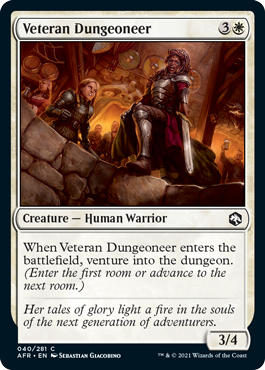
Veteran Dungeoneer
{3}{W}
Creature — Human Warrior
3/4
When Veteran Dungeoneer enters the battlefield, venture into the dungeon. (Enter the first room or advance to the next room.)
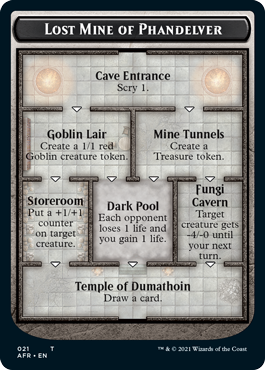
Lost Mine of Phandelver
Dungeon
Cave Entrance — Scry 1. (Leads to: Goblin Lair, Mine Tunnels)
Goblin Lair — Create a 1/1 red Goblin creature token. (Leads to: Storeroom, Dark Pool)
Mine Tunnels — Create a Treasure token. (Leads to: Dark Pool, Fungi Cavern)
Storeroom — Put a +1/+1 counter on target creature. (Leads to: Temple of Dumathoin)
Dark Pool — Each opponent loses 1 life and you gain 1 life. (Leads to: Temple of Dumathoin)
Fungi Cavern — Target creature gets -4/-0 until your next turn. (Leads to: Temple of Dumathoin)
Temple of Dumathoin — Draw a card.
Some cards, like Veteran Dungeoneer, tell you to "venture into the dungeon." This is a new keyword action. If you aren't in a dungeon yet, this means to put a dungeon card you own into the command zone and put a venture marker in the first room. A venture marker is any item, such as a coin or a mini, that you use to track which room you're in. The next time you venture into the dungeon, you'll move into the next room, following the arrows on the card. If there is more than one room that you could move to next, you choose which one to go into.
Every room has a triggered ability associated with it. The effect of each of these abilities is printed in the corresponding room. The triggered ability is "When you move your venture marker into this room, [effect]." For example, when you move your venture marker into Cave Entrance (the first room of Lost Mine of Phandelver), scry 1.
After you move your venture marker into the last room of a dungeon and that room's ability resolves (or otherwise leaves the stack), the dungeon leaves the game and you have now completed it. When you're instructed to venture again, you start over in the first room of a dungeon. This can be a new dungeon or you can start over in the dungeon you just completed.
Some cards also care about whether you've completed a dungeon or have an ability that triggers when you complete a dungeon, such as Dungeon Crawler.
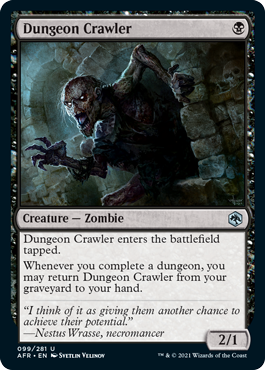
Dungeon Crawler
{B}
Creature — Zombie
2/1
Dungeon Crawler enters the battlefield tapped.
Whenever you complete a dungeon, you may return Dungeon Crawler from your graveyard to your hand.
That's dungeons in a nutshell. There are three of them in Adventures in the Forgotten Realms, and they will be found frequently in booster packs. For Limited events, you can play with dungeons even if they're not in your card pool. This means they don't need to be drafted with the rest of the cards in a pack, and they don't need to be opened as part of your sealed deck. Players have access to all three dungeons at all times.
- Dungeon cards begin outside the game, and can only be brought into the game by cards that say "venture into the dungeon."
- The player venturing into the dungeon chooses which dungeon they will venture into.
- Dungeon cards are not part of a player's deck or sideboard. Players can use any dungeon they own.
- You can only move forward (well, downward) in a dungeon, never backwards or sideways.
- Dungeons are removed from the game as a state-based action.
- If you somehow venture into the dungeon while a room's ability is on the stack, you will continue on in the dungeon. If you're already in the last room, complete that dungeon and start a new one.
- Whenever a player ventures into the dungeon, no player can respond until after that player has selected which dungeon to enter and its first room ability has triggered.
Flavor Words
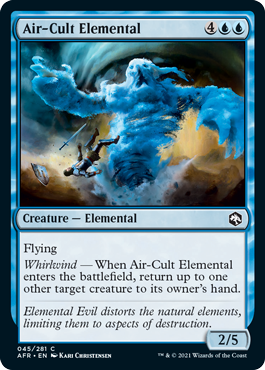
Air-Cult Elemental
{4}{U}{U}
Creature — Elemental
2/5
Flying
Whirlwind — When Air-Cult Elemental enters the battlefield, return up to one other target creature to its owner's hand.
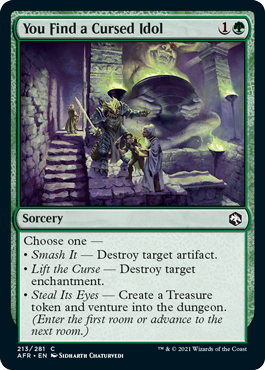
You Find a Cursed Idol
{1}{G}
Sorcery
Choose one —
• Smash It — Destroy target artifact.
• Lift the Curse — Destroy target enchantment.
• Steal Its Eyes — Create a Treasure token and venture into the dungeon. (Enter the first room or advance to the next room.)
In Adventures in the Forgotten Realms, we've turned the dial up on card flavor by using italicized words to contribute to the theme of many individual abilities. In some cases, these precede triggered or activated abilities on a card. In other cases, they allow you to choose a mode in a flavorful way. Much like ability words, these terms have no rules meaning.
New Mechanic: Rolling Dice
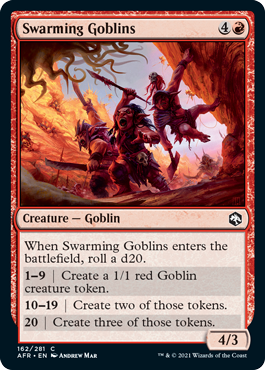
Swarming Goblins
{4}{R}
Creature — Goblin
4/3
When Swarming Goblins enters the battlefield, roll a d20.
1–9 | Create a 1/1 red Goblin creature token.
10–19 | Create two of those tokens.
20 | Create three of those tokens.
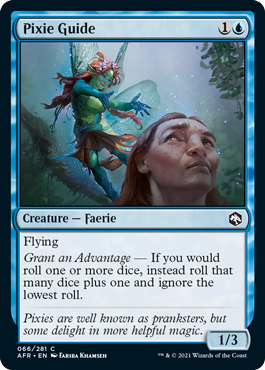
Pixie Guide
{1}{U}
Creature — Faerie
1/3
Flying
Grant an Advantage — If you would roll one or more dice, instead roll that many dice plus one and ignore the lowest roll.
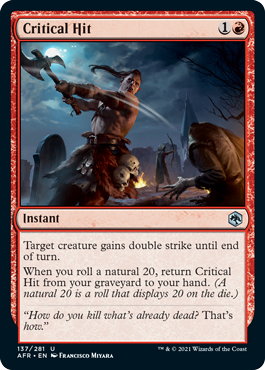
Critical Hit
{1}{R}
Instant
Target creature gains double strike until end of turn.
When you roll a natural 20, return Critical Hit from your graveyard to your hand. (A natural 20 is a roll that displays 20 on the die.)
In Adventures in the Forgotten Realms, we introduce dice rolling to black-bordered Magic for the first time. Many cards instruct you to roll dice and then tell you what to do based on the outcome. Some cards have abilities that trigger whenever you roll dice or whenever you roll a certain result. Some other cards modify die rolls.
- Each die is identified by the number of faces it has. For example, a d20 is a twenty-sided die. Each die must have equally likely outcomes and the roll must be fair. Although physical dice are recommended, digital substitutes are allowed, provided they have the same number of equally likely outcomes as specified in the original roll instruction.
- An ability that tells you to roll a die will also specify what to do with the result of that roll. Most often, this is in the form of a "results table" in the card text.
- The instruction to roll a die and the effect that occurs because of the result are all part of the same ability. Players do not get the chance to respond to the ability after knowing the result of the roll.
- An effect that says "choose a target, then roll a d20" or similar still uses the normal process of putting an ability on the stack and resolving it. Choosing targets is part of putting the ability on the stack and rolling the d20 happens later, as the ability resolves.
- Some effects may modify the result of a die roll. This may be part of the instruction to roll a die or it may come from other cards. Anything that references the "result" of a die roll is looking for the result after these modifications. Anything that is looking for the "natural result" is looking for the number shown on the face of the die before these modifications.
- Some abilities, like that of Pixie Guide and Barbarian Class, replace rolling a die with rolling extra dice and ignoring the lowest roll. The ignored rolls are not considered for the effect that instructed you to roll a die, and do not cause abilities to trigger. For all intents and purposes, once you determine which dice count, the extra dice were never rolled.
- Some effects instruct you to roll again. This uses the same number and type of dice as the original roll, and that roll will use the same set of possible outcomes.
- While playing Planechase, rolling the planar die will cause any ability that triggers whenever a player rolls one or more dice to trigger. However, any effect that refers to a numerical result will ignore the rolling of the planar die.
New Enchantment Type: Class
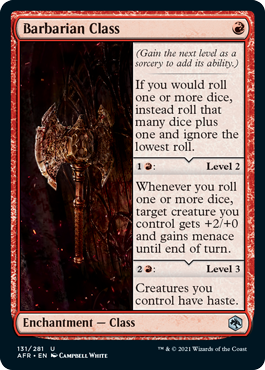
Barbarian Class
{R}
Enchantment — Class
(Gain the next level as a sorcery to add its ability.)
If you would roll one or more dice, instead roll that many dice plus one and ignore the lowest roll.
{1}{R}: Level 2
Whenever you roll one or more dice, target creature you control gets +2/+0 and gains menace until end of turn.
{2}{R}: Level 3
Creatures you control have haste.
Who would dare go on an adventure without choosing a class and knowing how to level up? In this set we introduce a new type of enchantment, the Class enchantment. Each one starts with just a basic ability, but can also level up to level 2 and level 3 to gain even more abilities!
- Each Class has five abilities. The three in the major sections of its text box are class abilities. Class abilities can be static, activated, or triggered abilities. The other two are level abilities, one activated ability to advance the Class to level 2 and another to advance the Class to level 3.
- Each Class starts with only the first of three class abilities. As the first level ability resolves, the Class becomes level 2 and gains the second class ability. As the second level ability resolves, the Class becomes level 3 and gains the third class ability.
- Gaining a level won't remove abilities that a Class had at a previous level.
- Gaining a level is a normal activated ability. It uses the stack and can be responded to.
- You can't activate the first level ability of a Class unless that Class is level 1. Similarly, you can't activate the second level ability of a Class unless that Class is level 2.
- You can multiclass or even control multiple Class enchantments of the same class. Each Class permanent tracks its own level separately.
- Some Class cards have an effect that increases when more are under your control. For example, if you have multiple Barbarian Class cards, you roll that many additional dice and ignore that many of the lowest rolls.
New Ability Word: Pack Tactics
Sometimes victory in a Dungeons & Dragons encounter requires careful planning, expert communication, and flawless execution. Sometimes you attack with everything and hope for the best. Pack tactics is a new ability word that highlights abilities that trigger whenever a creature attacks as part of an attacking force with power 6 or greater.
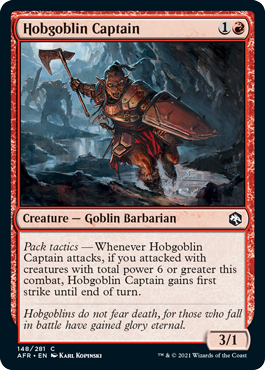
Hobgoblin Captain
{1}{R}
Creature — Goblin Barbarian
3/1
Pack tactics — Whenever Hobgoblin Captain attacks, if you attacked with creatures with total power 6 or greater this combat, Hobgoblin Captain gains first strike until end of turn.
- A creature's pack tactics ability won't trigger if that creature doesn't attack, even if you attack with other creatures with total power 6 or greater.
- Once a pack tactics ability triggers, it doesn't matter what happens to the attacking creatures. The ability will resolve even if some or all of those creatures leave the battlefield in response, or if their total power falls below 6.
- A pack tactics ability considers the total power of the creatures at the moment you attack with them. If there are any static abilities increasing a creature's power as long as it's attacking, those bonuses will count. However, if a creature has a triggered ability that increases its power that triggers whenever it attacks, that bonus will not count.
ADVENTURES IN THE FORGOTTEN REALMS MAIN SET CARD-SPECIFIC NOTES
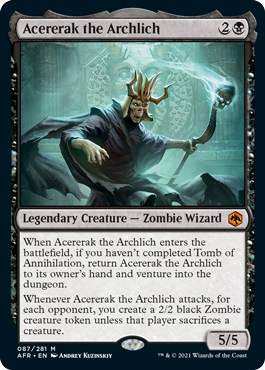
Acererak the Archlich
{2}{B}
Legendary Creature — Zombie Wizard
5/5
When Acererak the Archlich enters the battlefield, if you haven't completed Tomb of Annihilation, return Acererak the Archlich to its owner's hand and venture into the dungeon.
Whenever Acererak the Archlich attacks, for each opponent, you create a 2/2 black Zombie creature token unless that player sacrifices a creature.
- Acererak the Archlich has an intervening if clause in its first triggered ability. If you have completed Tomb of Annihilation, the ability won't trigger at all. If it does trigger, but you somehow complete Tomb of Annihilation while the ability is on the stack, then the ability won't do anything. You won't return Acererak to its owner's hand and you won't venture into the dungeon.
- If Acererak is no longer on the battlefield as its first ability resolves and you haven't completed Tomb of Annihilation, you will still venture into the dungeon.
- In a multiplayer game, each opponent decides in turn order whether or not they will sacrifice a creature and which one they will sacrifice. Each opponent knows the choices made before they make their own choice. Then, once all opponents have chosen, creatures are sacrificed and tokens are created simultaneously.
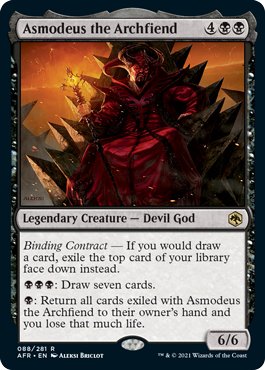
Asmodeus the Archfiend
{4}{B}{B}
Legendary Creature — Devil God
6/6
Binding Contract — If you would draw a card, exile the top card of your library face down instead.
{B}{B}{B}: Draw seven cards.
{B}: Return all cards exiled with Asmodeus the Archfiend to their owner's hand and you lose that much life.
- If a card is exiled face-down and no player has been given permission to look at it, no player is allowed to look at it as long as it remains exiled face-down.
- If your library is empty, no cards will be exiled but you won't lose the game due to drawing from an empty library.
- If Asmodeus the Archfiend leaves the battlefield before you activate its last ability, any cards exiled by its replacement effect remain exiled face down for the rest of the game. If you somehow return the same Asmodeus the Archfiend card to the battlefield, it will be a different object with no connection to those face-down cards.
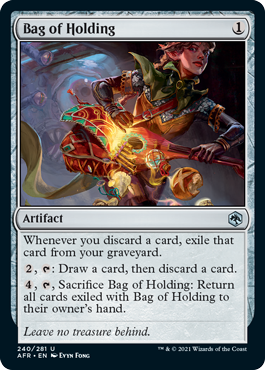
Bag of Holding
{1}
Artifact
Whenever you discard a card, exile that card from your graveyard.
{2}, {T}: Draw a card, then discard a card.
{4}, {T}, Sacrifice Bag of Holding: Return all cards exiled with Bag of Holding to their owner's hand.
- If you discard a card but that card is not in your graveyard as Bag of Holding's first ability resolves, that card remains wherever it has moved.
- If you control more than one Bag of Holding, you choose which one will hold the discarded card. Other Bags of Holding can't return that card.
- You both draw and discard while Bag of Holding's second ability is resolving. No player may take any action—nor can anything else happen—until you've both drawn and discarded.
- If Bag of Holding is moved to exile when you sacrifice it (perhaps due to Leyline of the Void's effect), it remains in exile. It won't be returned to your hand.
- If Bag of Holding leaves the battlefield, the items it contained are exiled forever (and, perhaps, scattered throughout the Astral Plane). If the same Bag of Holding card returns to the battlefield, it's considered a new object without access to the cards stored by the old object.
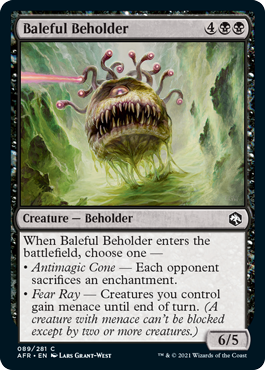
Baleful Beholder
{4}{B}{B}
Creature — Beholder
6/5
When Baleful Beholder enters the battlefield, choose one —
• Antimagic Cone — Each opponent sacrifices an enchantment.
• Fear Ray — Creatures you control gain menace until end of turn. (A creature with menace can't be blocked except by two or more creatures.)
- In a multiplayer game, each opponent in turn order will choose which enchantment to sacrifice, and they get to know the choices made before them by other players. Once those decisions are made, the chosen enchantments are all sacrificed at the same time.
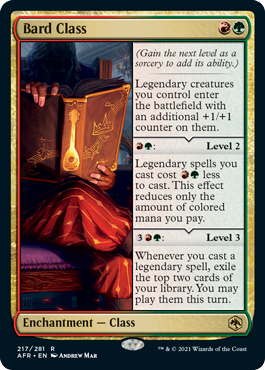
Bard Class
{R}{G}
Enchantment — Class
(Gain the next level as a sorcery to add its ability.)
Legendary creatures you control enter the battlefield with an additional +1/+1 counter on them.
{R}{G}: Level 2
Legendary spells you cast cost {R}{G} less to cast. This effect reduces only the amount of colored mana you pay.
{3}{R}{G}: Level 3
Whenever you cast a legendary spell, exile the top two cards of your library. You may play them this turn.
- If you control multiple Bard Classes, legendary creatures you control enter the battlefield with that many additional +1/+1 counters.
- Unlike most abilities that reduce the costs of spells, Bard Class's level 2 ability cannot be applied to generic mana costs. For example, a spell that costs {2}{G} to cast would instead cost {2} to cast.
- If you do not play the cards exiled with Bard Class's level 3 ability on the turn they are exiled, they will remain exiled indefinitely and cannot be played on a later turn.
- If you exile a modal double-faced card this way, you may cast either face of that card.
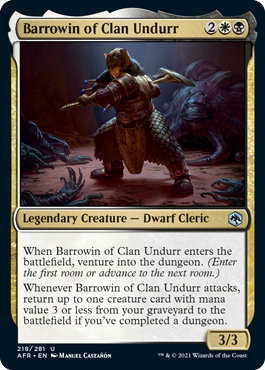
Barrowin of Clan Undurr
{2}{W}{B}
Legendary Creature — Dwarf Cleric
3/3
When Barrowin of Clan Undurr enters the battlefield, venture into the dungeon. (Enter the first room or advance to the next room.)
Whenever Barrowin of Clan Undurr attacks, return up to one creature card with mana value 3 or less from your graveyard to the battlefield if you've completed a dungeon.
- Barrowin of Clan Undurr's last ability works even if it wasn't on the battlefield when you completed a dungeon.
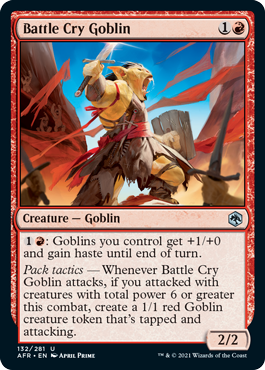
Battle Cry Goblin
{1}{R}
Creature — Goblin
2/2
{1}{R}: Goblins you control get +1/+0 and gain haste until end of turn.
Pack tactics — Whenever Battle Cry Goblin attacks, if you attacked with creatures with total power 6 or greater this combat, create a 1/1 red Goblin creature token that's tapped and attacking.
- Battle Cry Goblin's activated ability will affect only Goblins you control as it resolves. If you activate it before attacking and then create a Goblin with its triggered ability during combat, the Goblin you create will not get +1/+0.
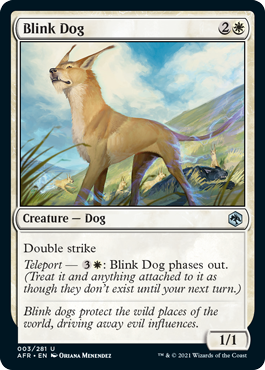
Blink Dog
{2}{W}
Creature — Dog
1/1
Double strike
Teleport — {3}{W}: Blink Dog phases out. (Treat it and anything attached to it as though they don't exist until your next turn.)
- Phased out permanents are treated as though they don't exist. They can't be the target of spells or abilities, their static abilities have no effect on the game, their triggered abilities can't trigger, they can't attack or block, and so on.
- As Blink Dog phases out, Auras and Equipment attached to it also phase out at the same time. Those Auras and Equipment will phase in at the same time Blink Dog does, and they'll phase in still attached to Blink Dog.
- Permanents phase back in during their controller's untap step, immediately before that player untaps their permanents. Creatures that phase in this way are able to attack and pay a cost of {T} during that turn. If a permanent had counters on it when it phased out, it will have those counters when it phases back in.
- An attacking or blocking creature that phases out is removed from combat.
- Phasing out doesn't cause any "leaves the battlefield" abilities to trigger. Similarly, phasing in won't cause any "enters the battlefield" abilities to trigger.
- Any continuous effects with a "for as long as" duration, such as that of Mind Flayer, ignore phased-out objects. If ignoring those objects causes the effect's conditions to no longer be met, the duration will expire.
- Choices made for permanents as they entered the battlefield are remembered when they phase in.
- If an opponent gains control of your Blink Dog, activates its teleport ability, and the duration of the control-change effect expires before it phases in, Blink Dog phases in under your control as that opponent's next untap step begins. If they leave the game before their next untap step, Blink Dog phases in as the next untap step begins after their turn would have begun.
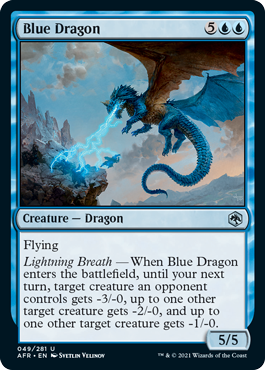
Blue Dragon
{5}{U}{U}
Creature — Dragon
5/5
Flying
Lightning Breath — When Blue Dragon enters the battlefield, until your next turn, target creature an opponent controls gets -3/-0, up to one other target creature gets -2/-0, and up to one other target creature gets -1/-0.
- Blue Dragon's Lightning Breath ability cannot target the same creature multiple times.
- The last two targets are optional, but the first target is not. If an opponent has at least one creature the ability could target, you must choose a target to get -3/-0. (Note that the last two targets can be any creature, not just one an opponent controls.)
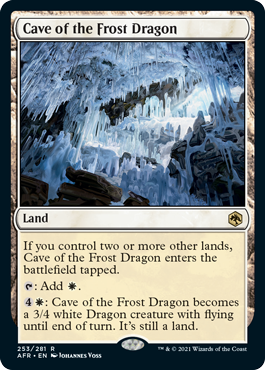
Cave of the Frost Dragon
Land
If you control two or more other lands, Cave of the Frost Dragon enters the battlefield tapped.
{T}: Add {W}.
{4}{W}: Cave of the Frost Dragon becomes a 3/4 white Dragon creature with flying until end of turn. It's still a land.
- If Cave of the Frost Dragon enters the battlefield at the same time as one or more other lands, it doesn't take those lands into consideration when determining how many other lands you control.
- If you turn Cave of the Frost Dragon into a creature but haven't controlled it continuously since your most recent turn began, you won't be able to activate its mana ability or attack with it.
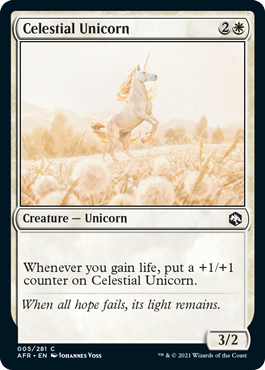
Celestial Unicorn
{2}{W}
Creature — Unicorn
3/2
Whenever you gain life, put a +1/+1 counter on Celestial Unicorn.
- If you gain life at the same time Celestial Unicorn is dealt lethal damage, it dies before its ability can put a +1/+1 counter on it.
- An ability that triggers "whenever you gain life" triggers just once for each life gain event, no matter how much life you gain.
- Each creature with lifelink dealing combat damage causes a separate life gain event. For example, if two creatures you control with lifelink deal combat damage at the same time, a "whenever you gain life" ability will trigger twice. However, if a single creature you control with lifelink deals combat damage to multiple creatures, players, and/or planeswalkers at the same time (perhaps because it has trample or was blocked by more than one creature), the ability will trigger only once.
- If you gain an amount of life "for each" of something, that life is gained as one event and the ability will trigger only once.
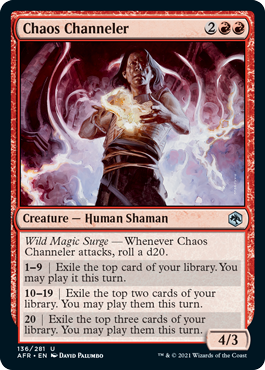
Chaos Channeler
{2}{R}{R}
Creature — Human Shaman
4/3
Wild Magic Surge — Whenever Chaos Channeler attacks, roll a d20.
1–9 | Exile the top card of your library. You may play it this turn.
10–19 | Exile the top two cards of your library. You may play them this turn.
20 | Exile the top three cards of your library. You may play them this turn.
- The cards are exiled face up.
- If you do not play the exiled cards on the turn that they are exiled, they remain exiled indefinitely.
- Normal costs and timing permissions apply to cards played this way. Unless an effect says you can play additional lands during your turn, you cannot play a land exiled this way if you have already played one this turn.
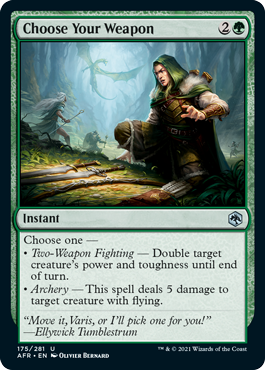
Choose Your Weapon
{2}{G}
Instant
Choose one —
• Two-Weapon Fighting — Double target creature's power and toughness until end of turn.
• Archery — This spell deals 5 damage to target creature with flying.
- If an effect instructs you to "double" a creature's power, that creature gets +X/+0, where X is its power as that effect begins to apply. The same is true for toughness.
- If a creature's power is less than 0 when it's doubled, instead that creature gets -X/-0, where X is how much less than 0 its power is. For example, if an effect has given a 2/2 creature -4/-0 so that it's a -2/2 creature, doubling its power and toughness gives it -2/+2, and it becomes a -4/4 creature.
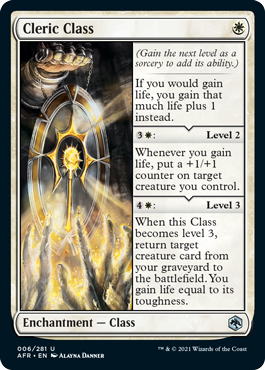
Cleric Class
{W}
Enchantment — Class
(Gain the next level as a sorcery to add its ability.)
If you would gain life, you gain that much life plus 1 instead.
{3}{W}: Level 2
Whenever you gain life, put a +1/+1 counter on target creature you control.
{4}{W}: Level 3
When this Class becomes level 3, return target creature card from your graveyard to the battlefield. You gain life equal to its toughness.
- If you gain life at the same time a creature is dealt lethal damage, it dies before Cleric Class's level 2 ability can put a +1/+1 counter on it.
- An ability that triggers "whenever you gain life" triggers just once for each life gain event, no matter how much life you gain.
- Each creature with lifelink dealing combat damage causes a separate life gain event. For example, if two creatures you control with lifelink deal combat damage at the same time, you will gain 2 additional life from Cleric Class's first ability and its level 2 ability will trigger twice. However, if a single creature you control with lifelink deals combat damage to multiple creatures, players, and/or planeswalkers at the same time (perhaps because it has trample or was blocked by more than one creature), you will only gain 1 additional life and the ability will trigger only once.
- If you gain an amount of life "for each" of something, that life is gained as one event and the ability will trigger only once.
- When Cleric Class's level 3 ability resolves, you gain life equal to the creature's toughness as it exists on battlefield, which may be different than its toughness in the graveyard.
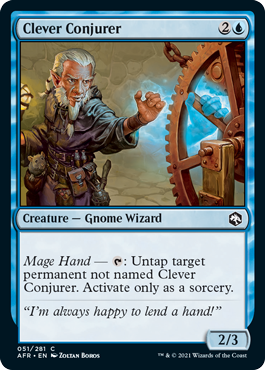
Clever Conjurer
{2}{U}
Creature — Gnome Wizard
2/3
Mage Hand — {T}: Untap target permanent not named Clever Conjurer. Activate only as a sorcery.
- If Clever Conjurer somehow loses the name Clever Conjurer, perhaps because you mutated another creature on top of it or copied it with Sakashima the Impostor, it can target itself with its Mage Hand ability. How clever!
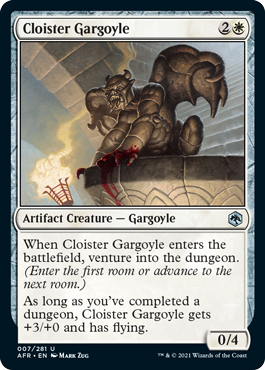
Cloister Gargoyle
{2}{W}
Artifact Creature — Gargoyle
0/4
When Cloister Gargoyle enters the battlefield, venture into the dungeon. (Enter the first room or advance to the next room.)
As long as you've completed a dungeon, Cloister Gargoyle gets +3/+0 and has flying.
- Cloister Gargoyle's last ability works even if it wasn't on the battlefield when you completed a dungeon.
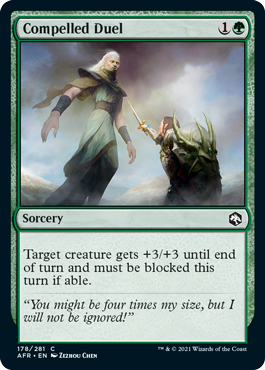
Compelled Duel
{1}{G}
Sorcery
Target creature gets +3/+3 until end of turn and must be blocked this turn if able.
- Only one creature is required to block the affected creature. Other creatures may also block it and are free to block other creatures or not block at all.
- If each creature the defending player controls can't block for any reason (such as being tapped), then the affected creature isn't blocked. If there's a cost associated with blocking the affected creature, the defending player isn't forced to pay that cost, so it doesn't have to be blocked in that case either.
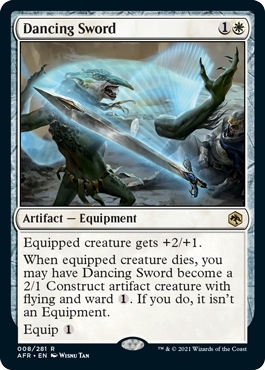
Dancing Sword
{1}{W}
Artifact — Equipment
Equipped creature gets +2/+1.
When equipped creature dies, you may have Dancing Sword become a 2/1 Construct artifact creature with flying and ward {1}. If you do, it isn't an Equipment.
Equip {1}
- If you choose not to have Dancing Sword become a creature as its triggered ability resolves, it will remain an Equipment and can be equipped to another creature as normal.
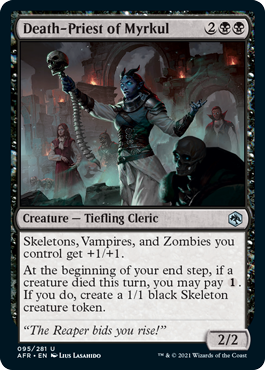
Death-Priest of Myrkul
{2}{B}{B}
Creature — Tiefling Cleric
2/2
Skeletons, Vampires, and Zombies you control get +1/+1.
At the beginning of your end step, if a creature died this turn, you may pay {1}. If you do, create a 1/1 black Skeleton creature token.
- A creature you control that's more than one of the creature types listed in the first ability will get only +1/+1.
- Death-Priest of Myrkul doesn't need to have been on the battlefield when the creature died. For example, if a creature dies during combat on your turn and you cast Death-Priest of Myrkul during your second main phase, its last ability will trigger at the beginning of your end step.
- Death-Priest of Myrkul's last ability will trigger only once during your end step, no matter how many creatures died this turn. However, if no creatures have died so far this turn as the end step begins, the ability won't trigger at all. It's not possible to cause a creature to die during the end step in time to have the ability trigger.
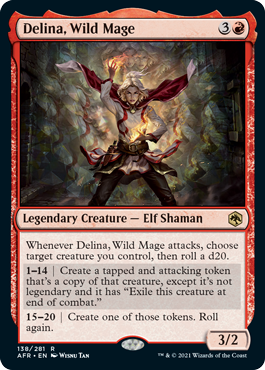
Delina, Wild Mage
{3}{R}
Legendary Creature — Elf Shaman
3/2
Whenever Delina, Wild Mage attacks, choose target creature you control, then roll a d20.
1–14 | Create a tapped and attacking token that's a copy of that creature, except it's not legendary and it has "Exile this creature at end of combat."
15–20 | Create one of those tokens. You may roll again.
- Delina, Wild Mage has received an update to its Oracle text. The official text is listed above. Specifically, rolling again on a result of 15–20 is optional.
- You declare which player or planeswalker the token is attacking as you put it onto the battlefield. It doesn't have to be the same player or planeswalker Delina, Wild Mage is attacking.
- Although the token is attacking, it was never declared as an attacking creature (for purposes of abilities that trigger whenever a creature attacks, for example).
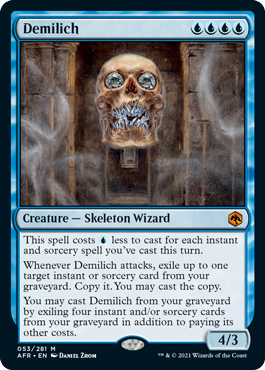
Demilich
{U}{U}{U}{U}
Creature — Skeleton Wizard
4/3
This spell costs {U} less to cast for each instant and sorcery spell you've cast this turn.
Whenever Demilich attacks, exile up to one target instant or sorcery card from your graveyard. Copy it. You may cast the copy.
You may cast Demilich from your graveyard by exiling four instant and/or sorcery cards from your graveyard in addition to paying its other costs.
- While casting Demilich, if you are required to pay an additional cost that includes a generic mana component, Demilich's cost reduction effect can apply to it. For example, if you're required to pay an additional {1} to cast Demilich (perhaps because of Sphere of Resistance), and you've cast five or more instant and/or sorcery spells this turn, you would pay {0} to cast Demilich.
- If you exile a card as the triggered ability resolves, that card will remain exiled whether you cast the copy or not.
- Casting the copy happens as part of the resolution of Demilich's triggered ability. If you choose to cast it, you must do so right away. If you choose not to cast it right away, the copy ceases to exist the next time a player would receive priority.
- You must pay all normal costs for casting the copy.
- Demilich's last ability doesn't change when you can cast it. In most cases, you can cast Demilich only during your main phase.
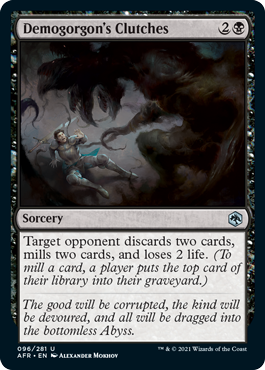
Demogorgon's Clutches
{2}{B}
Sorcery
Target opponent discards two cards, mills two cards, and loses 2 life. (To mill a card, a player puts the top card of their library into their graveyard.)
- Demogorgon's Clutches requires its target to discard cards before milling cards. This means they do not get to know what cards are milled when they choose what cards to discard.
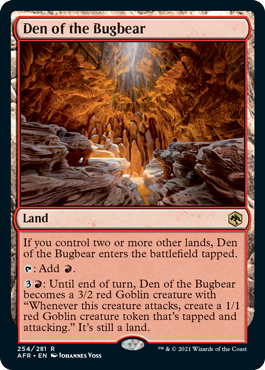
Den of the Bugbear
Land
If you control two or more other lands, Den of the Bugbear enters the battlefield tapped.
{T}: Add {R}.
{3}{R}: Until end of turn, Den of the Bugbear becomes a 3/2 red Goblin creature with "Whenever this creature attacks, create a 1/1 red Goblin creature token that's tapped and attacking." It's still a land.
- If Den of the Bugbear enters the battlefield at the same time as one or more other lands, it doesn't take those lands into consideration when determining how many other lands you control.
- If you turn Den of the Bugbear into a creature but haven't controlled it continuously since your most recent turn began, you won't be able to activate its mana ability or attack with it.
- If Den of the Bugbear's last ability is activated multiple times in one turn, it will have multiple instances of the triggered ability that it grants. For example, if you activate it twice and attack, you will create two 1/1 red Goblin creature tokens that are tapped and attacking.
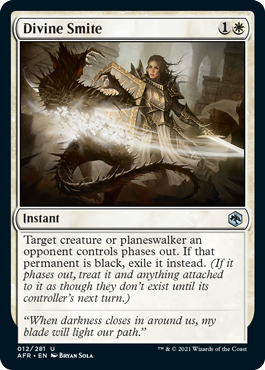
Divine Smite
{1}{W}
Instant
Target creature or planeswalker an opponent controls phases out. If that permanent is black, exile it instead. (If it phases out, treat it and anything attached to it as though they don't exist until its controller's next turn.)
- Phased out permanents are treated as though they don't exist. They can't be the target of spells or abilities, their static abilities have no effect on the game, their triggered abilities can't trigger, they can't attack or block, and so on.
- As a creature is phased out, Auras and Equipment attached to it also phase out at the same time. Those Auras and Equipment will phase in at the same time that creature does, and they'll phase in still attached to that creature.
- Permanents phase back in during their controller's untap step, immediately before that player untaps their permanents. Creatures that phase in this way are able to attack and pay a cost of {T} during that turn. If a permanent had counters on it when it phased out, it will have those counters when it phases back in.
- An attacking or blocking creature that phases out is removed from combat.
- Phasing out doesn't cause any "leaves the battlefield" abilities to trigger. Similarly, phasing in won't cause any "enters the battlefield" abilities to trigger.
- Any continuous effects with a "for as long as" duration, such as that of Mind Flayer, ignore phased-out objects. If ignoring those objects causes the effect's conditions to no longer be met, the duration will expire.
- Choices made for permanents as they entered the battlefield are remembered when they phase in.
- If an opponent gains control of your nonblack creature, you phase it out with Divine Smite, and the duration of the control-change effect expires before it phases back in, your creature phases in under your control as that opponent's next untap step begins. If they leave the game before their next untap step, it phases in as the next untap step begins after their turn would have begun.
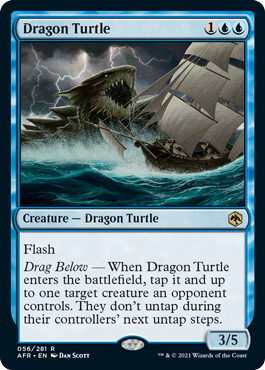
Dragon Turtle
{1}{U}{U}
Creature — Dragon Turtle
3/5
Flash
Drag Below — When Dragon Turtle enters the battlefield, tap it and up to one target creature an opponent controls. They don't untap during their controllers' next untap steps.
- If you target an opponent's creature with Dragon Turtle's Drag Below ability and that target is illegal as the ability tries to resolve, the entire ability is removed from the stack and does nothing. Dragon Turtle will remain untapped and will untap as normal during its controller's next untap step.
- If, however, there are no legal targets for the Drag Below ability when Dragon Turtle enters the battlefield (or you choose not to target anything), Dragon Turtle's ability will still resolve and cause it to be tapped and it won't untap during its controllers next untap step.
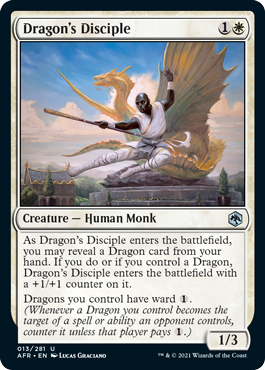
Dragon's Disciple
{1}{W}
Creature — Human Monk
1/3
As Dragon's Disciple enters the battlefield, you may reveal a Dragon card from your hand. If you do or if you control a Dragon, Dragon's Disciple enters the battlefield with a +1/+1 counter on it.
Dragons you control have ward {1}. (Whenever a Dragon you control becomes the target of a spell or ability an opponent controls, counter it unless that player pays {1}.)
- A Dragon card is a card with the creature type Dragon in its type line. Similarly, a creature on the battlefield is a Dragon if it has the Dragon creature type. A card that has "Dragon" in the name (such as Dragon's Disciple) isn't a Dragon card unless it also has the Dragon creature type.
- Revealing a Dragon card happens as Dragon's Disciple resolves. It is not an additional cost for casting the spell.
- If you choose to reveal a Dragon card from your hand and also control a Dragon, Dragon's Disciple still only gets a single +1/+1 counter.
- Players can respond to Dragon's Disciple while it is on the stack, but they cannot respond to the choice of whether or not to reveal a Dragon as it enters the battlefield. Notably, that means they can't remove your Dragon from play to prevent Dragon's Disciple from getting the counter once you've decided not to reveal a Dragon card.
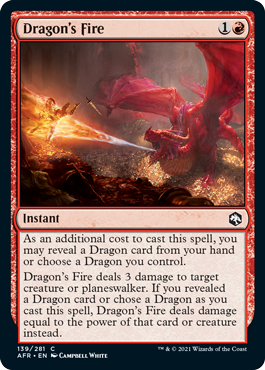
Dragon's Fire
{1}{R}
Instant
As an additional cost to cast this spell, you may reveal a Dragon card from your hand or choose a Dragon you control.
Dragon's Fire deals 3 damage to target creature or planeswalker. If you revealed a Dragon card or chose a Dragon as you cast this spell, Dragon's Fire deals damage equal to the power of that card or creature instead.
- A Dragon card is a card with the creature type Dragon in its type line. Similarly, a creature on the battlefield is a Dragon if it has the Dragon creature type. A card that has "Dragon" in the name (such as Dragon's Fire) isn't a Dragon card unless it also has the Dragon creature type.
- If you chose a Dragon you control, use that Dragon's power as Dragon's Fire resolves to determine how much damage is dealt. If the Dragon you chose is no longer on the battlefield as Dragon's Fire resolves, Dragon's Fire will deal damage equal to the power it had the last time it was on the battlefield.
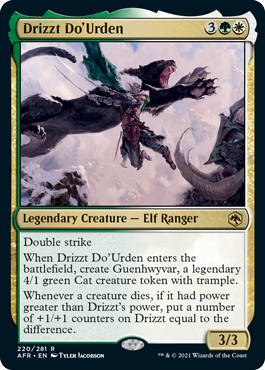
Drizzt Do'Urden
{3}{G}{W}
Legendary Creature — Elf Ranger
3/3
Double strike
When Drizzt Do'Urden enters the battlefield, create Guenhwyvar, a legendary 4/1 green Cat creature token with trample.
Whenever a creature dies, if it had power greater than Drizzt's power, put a number of +1/+1 counters on Drizzt equal to the difference.
- Drizzt's last ability checks his power both at the time the creature dies and at the time the ability resolves. Notably, this means that if several creatures with power greater than Drizzt's die at the same time, Drizzt's ability will trigger that many times, but some of those abilities may not put counters on him as they resolve.
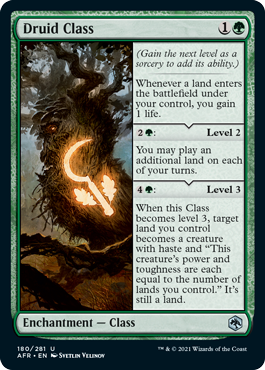
Druid Class
{1}{G}
Enchantment — Class
(Gain the next level as a sorcery to add its ability.)
Whenever a land enters the battlefield under your control, you gain 1 life.
{2}{G}: Level 2
You may play an additional land on each of your turns.
{4}{G}: Level 3
When this Class becomes level 3, target land you control becomes a creature with haste and "This creature's power and toughness are each equal to the number of lands you control." It's still a land.
- If you have more than one Druid Class at level 2 or higher, you can play that many additional lands per turn. For example, with two Druid Classes at level 2, you can play three lands during your turn.
- For the third ability, the power and toughness of the creature will change as the number of lands you control changes.
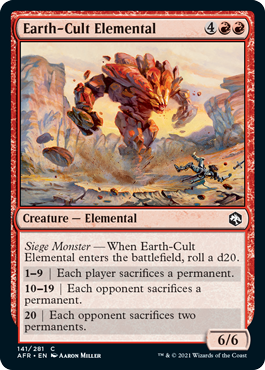
Earth-Cult Elemental
{4}{R}{R}
Creature — Elemental
6/6
Siege Monster — When Earth-Cult Elemental enters the battlefield, roll a d20.
1–9 | Each player sacrifices a permanent.
10–19 | Each opponent sacrifices a permanent.
20 | Each opponent sacrifices two permanents.
- Players decide in turn order, starting with the active player (or the next opponent in turn order if the active player isn't sacrificing anything), which permanent(s) they will sacrifice. Players later in turn order will know which permanents were picked by earlier players while they make this choice. Once all choices have been made, all permanents are sacrificed simultaneously.
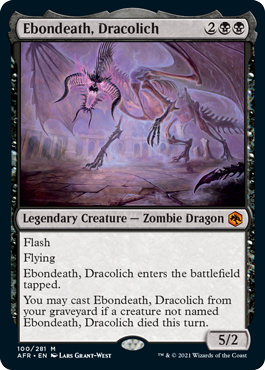
Ebondeath, Dracolich
{2}{B}{B}
Legendary Creature — Zombie Dragon
5/2
Flash
Flying
Ebondeath, Dracolich enters the battlefield tapped.
You may cast Ebondeath, Dracolich from your graveyard if a creature not named Ebondeath, Dracolich died this turn.
- Ebondeath, Dracolich's last ability cares only whether a creature not named Ebondeath, Dracolich died during the turn, even if Ebondeath, Dracolich wasn't in your graveyard when that happened. It doesn't matter if a creature named Ebondeath, Dracolich also died, and it doesn't matter what happens to the creature after it dies. For example, if the creature that died is a token or the creature card leaves the graveyard later in the turn, you can still cast Ebondeath, Dracolich.
- Ebondeath Dracolich cares what the creature's name was while it was last on the battlefield, not what it is in the graveyard. For example, if a creature with a different name becomes a copy of Ebondeath, Dracolich and then dies, you won't be able to cast Ebondeath, Dracolich from your graveyard.
- Casting Ebondeath, Dracolich from your graveyard follows the normal rules for casting that card. You must pay its costs, and you must follow all applicable timing rules.
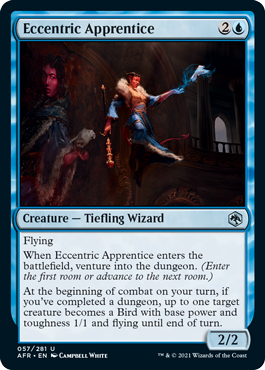
Eccentric Apprentice
{2}{U}
Creature — Tiefling Wizard
2/2
Flying
When Eccentric Apprentice enters the battlefield, venture into the dungeon. (Enter the first room or advance to the next room.)
At the beginning of combat on your turn, if you've completed a dungeon, up to one target creature becomes a Bird with base power and toughness 1/1 and flying until end of turn.
- Eccentric Apprentice's last ability works even if it wasn't on the battlefield when you completed a dungeon and even if the dungeon was completed on a previous turn.
- A creature that becomes a Bird this way loses all other creature types but does not lose any of its abilities.
- The last ability will overwrite any previous effects that set the creature's power and toughness to specific numbers. Effects that otherwise modify the target creature's power and toughness will still apply no matter when they took effect. The same is true for +1/+1 counters.
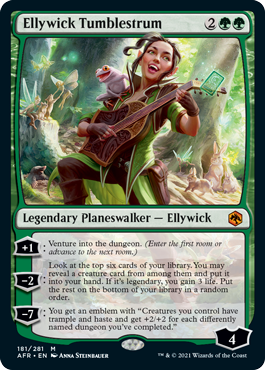
Ellywick Tumblestrum
{2}{G}{G}
Legendary Planeswalker — Ellywick
4
+1: Venture into the dungeon. (Enter the first room or advance to the next room.)
−2: Look at the top six cards of your library. You may reveal a creature card from among them and put it into your hand. If it's legendary, you gain 3 life. Put the rest on the bottom of your library in a random order.
−7: You get an emblem with "Creatures you control have trample and haste and get +2/+2 for each differently named dungeon you've completed."
- Ellywick Tumblestrum's last ability counts all dungeons you've completed, whether they were completed before or after the emblem was created.
- The emblem grants trample and haste even if you haven't completed a dungeon.
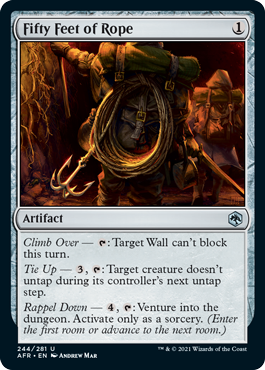
Fifty Feet of Rope
{1}
Artifact
Climb Over — {T}: Target Wall can't block this turn.
Tie Up — {3}, {T}: Target creature doesn't untap during its controller's next untap step.
Rappel Down — {4}, {T}: Venture into the dungeon. Activate only as a sorcery. (Enter the first room or advance to the next room.)
- Activating the Climb Over ability after a Wall has blocked won't change or undo that block.
- The Tie Up ability doesn't tap the creature, it just prevents it from untapping if it is already tapped or becomes tapped through some other means.
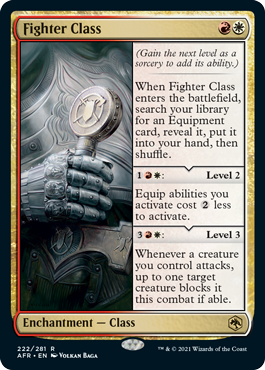
Fighter Class
{R}{W}
Enchantment — Class
(Gain the next level as a sorcery to add its ability.)
When Fighter Class enters the battlefield, search your library for an Equipment card, reveal it, put it into your hand, then shuffle.
{1}{R}{W}: Level 2
Equip abilities you activate cost {2} less to activate.
{3}{R}{W}: Level 3
Whenever a creature you control attacks, up to one target creature blocks it this combat if able.
- The discount to equip abilities applies only to generic mana requirements. If you control multiple Fighter Classes that are level 2 or higher, equip abilities cost {2} less for each one. This can't make an ability cost less than {0}.
- For the last triggered ability, if the target creature is tapped or is affected by a spell or ability that says it can't block, then it doesn't block. If there's a cost associated with having that creature block, its controller isn't forced to pay that cost, so it doesn't have to block in that case either.
- If the last triggered ability triggers more than once in the same combat, a single creature may be required to block more than one creature. As long as it doesn't have an ability that would allow that, its controller choose which attacking creature it blocks.
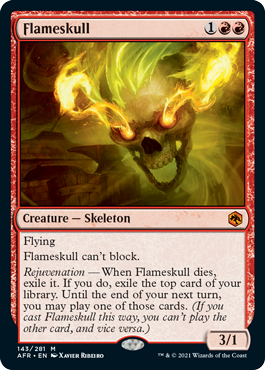
Flameskull
{1}{R}{R}
Creature — Skeleton
3/1
Flying
Flameskull can't block.
Rejuvenation — When Flameskull dies, exile it. If you do, exile the top card of your library. Until the end of your next turn, you may play one of those cards. (If you cast Flameskull this way, you can't play the other card, and vice versa.)
- Exiling Flameskull as its triggered ability resolves isn't optional, but if Flameskull leaves the graveyard before the ability starts resolving, you won't exile it or the top card of your library.
- You must still pay all costs and follow all timing rules for spells cast this way. Likewise, playing lands this way is subject to the normal rules for playing lands.
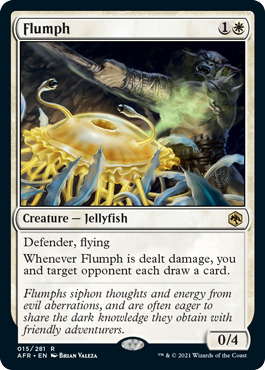
Flumph
{1}{W}
Creature — Jellyfish
0/4
Defender, flying
Whenever Flumph is dealt damage, you and target opponent each draw a card.
- Flumph's ability will trigger even if it is dealt lethal damage.
- Flumph's ability only triggers once each time it is dealt damage, even if multiple sources are dealing damage to it at once.
- Flumph's triggered ability is not optional. You must target an opponent if able.
- If the opponent is somehow an illegal target for Flumph's ability when it tries to resolve, neither player will draw a card.
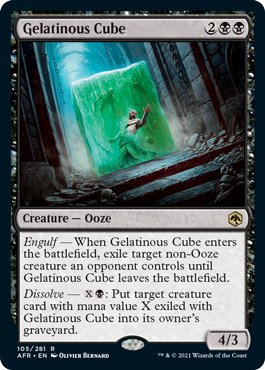
Gelatinous Cube
{2}{B}{B}
Creature — Ooze
4/3
Engulf — When Gelatinous Cube enters the battlefield, exile target non-Ooze creature an opponent controls until Gelatinous Cube leaves the battlefield.
Dissolve — {X}{B}: Put target creature card with mana value X exiled with Gelatinous Cube into its owner's graveyard.
- If Gelatinous Cube leaves the battlefield before its Engulf ability resolves, the target non-Ooze creature won't be exiled.
- Auras attached to the exiled creature will be put into their owners' graveyards. Any Equipment will become unattached and remain on the battlefield. Any counters on the exiled creature will cease to exist. When the card returns to the battlefield, it will be a new object with no connection to the card that was exiled.
- If a token is exiled this way, it will cease to exist and won't return to the battlefield.
- If the engulfed creature card leaves exile, perhaps because of the Dissolve ability, it won't return to the battlefield after Gelatinous Cube leaves the battlefield.
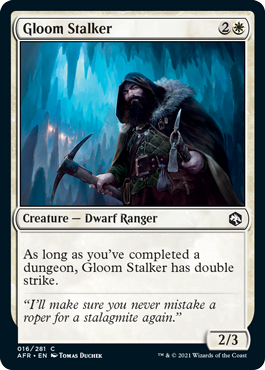
Gloom Stalker
{2}{W}
Creature — Dwarf Ranger
2/3
As long as you've completed a dungeon, Gloom Stalker has double strike.
- Gloom Stalker will have double strike even if it wasn't on the battlefield as you completed a dungeon.
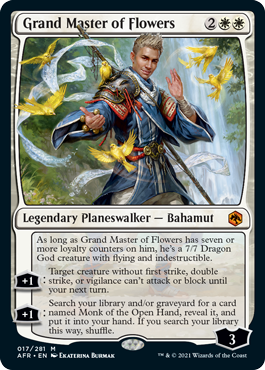
Grand Master of Flowers
{2}{W}{W}
Legendary Planeswalker — Bahamut
3
As long as Grand Master of Flowers has seven or more loyalty counters on him, he's a 7/7 Dragon God creature with flying and indestructible.
+1: Target creature without first strike, double strike, or vigilance can't attack or block until your next turn.
+1: Search your library and/or graveyard for a card named Monk of the Open Hand, reveal it, and put it into your hand. If you search your library this way, shuffle.
- While Grand Master of Flowers is a creature, he is not a planeswalker. He cannot be attacked and damage dealt to him while he is a creature will not reduce the number of loyalty counters he has. However, you may still activate his loyalty abilities as normal.
- You can activate the last ability of Grand Master of Flowers even if there isn't a card named Monk of the Open Hand in your library or graveyard.
- The first ability of Grand Master of Flowers doesn't use the stack and can't be responded to. Similarly, players can't respond to paying the cost of adding loyalty counters for an ability. Therefore, if Grand Master of Flowers has six loyalty and you activate one of his abilities, he will be a 7/7 Dragon God with flying and indestructible before players can respond to the loyalty ability.
- If Grand Master of Flowers somehow gains enough loyalty to become a creature while it is being attacked, it is removed from combat. If blockers haven't been declared yet, it may then block. It may even block creatures that were previously attacking it. Creatures that were previously attacking it that go unblocked won't deal combat damage.
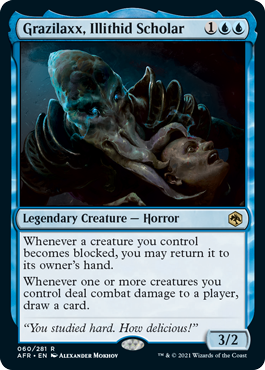
Grazilaxx, Illithid Scholar
{1}{U}{U}
Legendary Creature — Horror
3/2
Whenever a creature you control becomes blocked, you may return it to its owner's hand.
Whenever one or more creatures you control deal combat damage to a player, draw a card.
- Grazilaxx's first ability triggers before combat damage is dealt. If you choose to return the creature to your hand, it won't deal or receive combat damage.
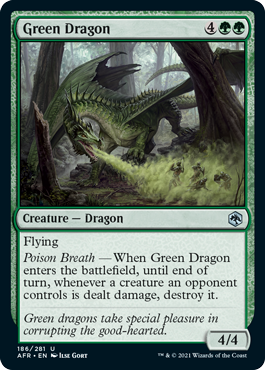
Green Dragon
{4}{G}{G}
Creature — Dragon
4/4
Flying
Poison Breath — When Green Dragon enters the battlefield, until end of turn, whenever a creature an opponent controls is dealt damage, destroy it.
- Green Dragon's Poison Breath ability continues to function until end of turn even if Green Dragon is destroyed or otherwise leaves the battlefield. It takes some time for toxic gas to dissipate.
- Green Dragon's Poison Breath ability is different than deathtouch. Notably, creatures still need to deal damage to a blocking creature equal to its toughness before dealing damage to another blocking creature or trampling over to a player or planeswalker.
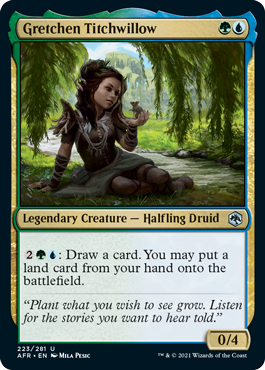
Gretchen Titchwillow
{G}{U}
Legendary Creature — Halfling Druid
0/4
{2}{G}{U}: Draw a card. You may put a land card from your hand onto the battlefield.
- Putting a land onto the battlefield this way doesn't count as playing a land and can be done even if you've played a land this turn or if it isn't your turn.
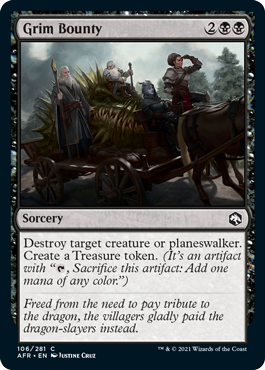
Grim Bounty
{2}{B}{B}
Sorcery
Destroy target creature or planeswalker. Create a Treasure token. (It's an artifact with "{T}, Sacrifice this artifact: Add one mana of any color.")
- If the target is not legal as Grim Bounty tries to resolve, perhaps because the creature or planeswalker is no longer on the battlefield, it will do nothing. You will not create a Treasure token.
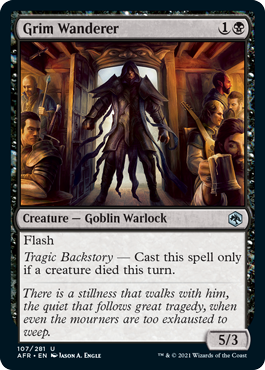
Grim Wanderer
{1}{B}
Creature — Goblin Warlock
5/3
Flash
Tragic Backstory — Cast this spell only if a creature died this turn.
- Grim Wanderer's ability doesn't care who controlled the creature that died.
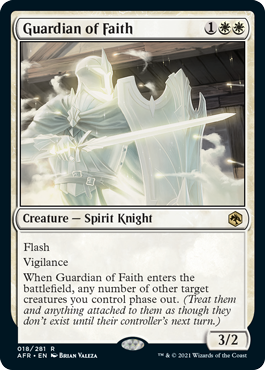
Guardian of Faith
{1}{W}{W}
Creature — Spirit Knight
3/2
Flash
Vigilance
When Guardian of Faith enters the battlefield, any number of other target creatures you control phase out. (Treat them and anything attached to them as though they don't exist until their controller's next turn.)
- Phased out permanents are treated as though they don't exist. They can't be the target of spells or abilities, their static abilities have no effect on the game, their triggered abilities can't trigger, they can't attack or block, and so on.
- As a creature is phased out, Auras and Equipment attached to it also phase out at the same time. Those Auras and Equipment will phase in at the same time that creature does, and they'll phase in still attached to that creature.
- Permanents phase back in during their controller's untap step, immediately before that player untaps their permanents. Creatures that phase in this way are able to attack and pay a cost of {T} during that turn. If a permanent had counters on it when it phased out, it will have those counters when it phases back in.
- An attacking or blocking creature that phases out is removed from combat.
- Phasing out doesn't cause any "leaves the battlefield" abilities to trigger. Similarly, phasing in won't cause any "enters the battlefield" abilities to trigger.
- Any continuous effects with a "for as long as" duration, such as that of Mind Flayer, ignore phased-out objects. If ignoring those objects causes the effect's conditions to no longer be met, the duration will expire.
- Choices made for permanents as they entered the battlefield are remembered when they phase in.
- If an opponent gains control of one of your creatures, that creature phases out, and the duration of the control-change effect expires before it phases back in, that creature phases in under your control as that opponent's next untap step begins. If they leave the game before their next untap step, it phases in as the next untap step begins after their turn would have begun.
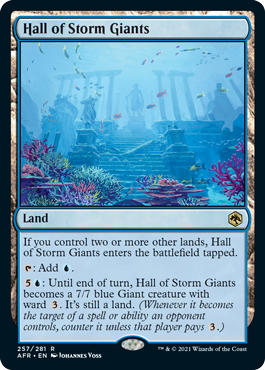
Hall of Storm Giants
Land
If you control two or more other lands, Hall of Storm Giants enters the battlefield tapped.
{T}: Add {U}.
{5}{U}: Until end of turn, Hall of Storm Giants becomes a 7/7 blue Giant creature with ward {3}. It's still a land. (Whenever it becomes the target of a spell or ability an opponent controls, counter it unless that player pays {3}.)
- If Hall of Storm Giants enters the battlefield at the same time as one or more other lands, it doesn't take those lands into consideration when determining how many other lands you control.
- If you turn Hall of Storm Giants into a creature but haven't controlled it continuously since your most recent turn began, you won't be able to activate its mana ability or attack with it.
- If you activate Hall of Storm Giants's last ability multiple times, it gains multiple instances of ward {3}. Each of those instances will trigger separately and ask the opponent who controls the spell or ability to pay {3}. If they don't for any of those instances, the spell or ability will be countered.
- If an opponent casts a spell or ability that targets Hall of Storm Giants, and you activate the last ability in response, the ward ability Hall of Storm Giants gains won't trigger. (However, if it already had ward at the moment it became the target of the spell or ability, that instance of ward would trigger.)
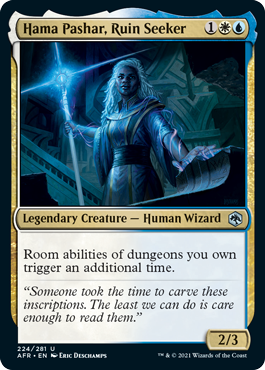
Hama Pashar, Ruin Seeker
{1}{W}{U}
Legendary Creature — Human Wizard
2/3
Room abilities of dungeons you own trigger an additional time.
- Hama Pashar, Ruin Seeker's ability causes the same room you ventured into to trigger an additional time. It does not cause you to move to the next room.
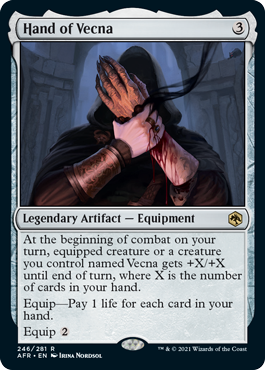
Hand of Vecna
{3}
Legendary Artifact — Equipment
At the beginning of combat on your turn, equipped creature or a creature you control named Vecna gets +X/+X until end of turn, where X is the number of cards in your hand.
Equip—Pay 1 life for each card in your hand.
Equip {2}
- If you control both Vecna and Hand of Vecna equipped to another creature, you choose which creature to apply the bonus to as the triggered ability resolves.
- Hand of Vecna's triggered ability uses the number of cards in your hand as it resolves to determine the bonus the creature gets. It won't change if the number of cards in your hand changes later in the turn.
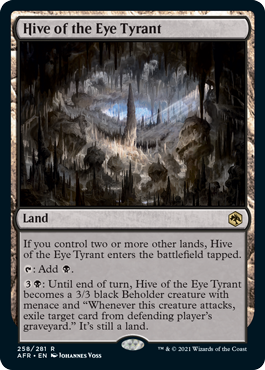
Hive of the Eye Tyrant
Land
If you control two or more other lands, Hive of the Eye Tyrant enters the battlefield tapped.
{T}: Add {B}.
{3}{B}: Until end of turn, Hive of the Eye Tyrant becomes a 3/3 black Beholder creature with menace and "Whenever this creature attacks, exile target card from defending player's graveyard." It's still a land.
- If Hive of the Eye Tyrant enters the battlefield at the same time as one or more other lands, it doesn't take those lands into consideration when determining how many other lands you control.
- If you turn Hive of the Eye Tyrant into a creature but haven't controlled it continuously since your most recent turn began, you won't be able to activate its mana ability or attack with it.
- If you activate Hive of the Eye Tyrant's last ability multiple times, it gains multiple instances of the triggered ability that exiles cards. For example, if you activate it twice and attack, you will choose two target cards to exile (or the same card twice, if you want to).
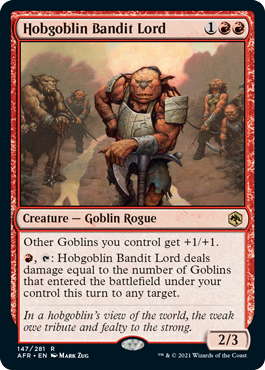
Hobgoblin Bandit Lord
{1}{R}{R}
Creature — Goblin Rogue
2/3
Other Goblins you control get +1/+1.
{R}, {T}: Hobgoblin Bandit Lord deals damage equal to the number of Goblins that entered the battlefield under your control this turn to any target.
- Hobgoblin Bandit Lord's activated ability only counts the number of Goblins that entered the battlefield this turn. It doesn't matter if those Goblins are still on the battlefield as it resolves.
- If no Goblins have entered the battlefield this turn, no damage will be dealt. Abilities that trigger whenever damage is dealt won't trigger.
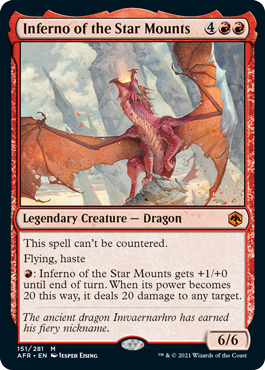
Inferno of the Star Mounts
{4}{R}{R}
Legendary Creature — Dragon
6/6
This spell can't be countered.
Flying, haste
{R}: Inferno of the Star Mounts gets +1/+0 until end of turn. When its power becomes 20 this way, it deals 20 damage to any target.
- You don't choose a target when you activate the activated ability. You choose a target for the linked triggered ability only if it triggers because the power of Inferno of the Star Mounts became 20.
- That triggered ability triggers only if the activated ability causes the power of Inferno of the Star Mounts to become exactly 20. If its power becomes 20 in any other way, the ability won't trigger. If its power becomes 21 or greater this way, the ability won't trigger.
- However, if you have a way to decrease its power, you can cause the triggered ability to trigger multiple times in a single turn.
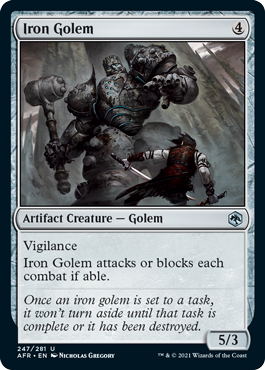
Iron Golem
{4}
Artifact Creature — Golem
5/3
Vigilance
Iron Golem attacks or blocks each combat if able.
- If the Iron Golem can't attack or block for any reason (such as being tapped), then it doesn't attack or block. If there's a cost associated with having it attack or block, its controller isn't forced to pay that cost, so it doesn't have to attack or block in that case either.
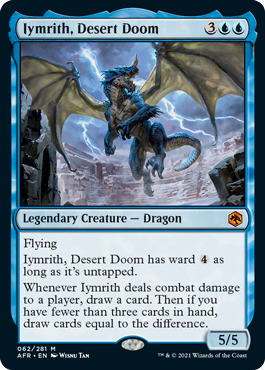
Iymrith, Desert Doom
{3}{U}{U}
Legendary Creature — Dragon
5/5
Flying
Iymrith, Desert Doom has ward {4} as long as it's untapped.
Whenever Iymrith deals combat damage to a player, draw a card. Then if you have fewer than three cards in hand, draw cards equal to the difference.
- If a spell or ability an opponent controls targets Iymrith, Desert Doom while it is tapped, finding a way to untap it in response will not cause its ward ability to trigger.
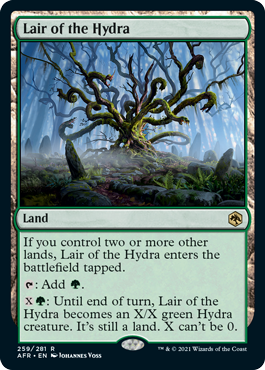
Lair of the Hydra
Land
If you control two or more other lands, Lair of the Hydra enters the battlefield tapped.
{T}: Add {G}.
{X}{G}: Until end of turn, Lair of the Hydra becomes an X/X green Hydra creature. It's still a land. X can't be 0.
- If Lair of the Hydra enters the battlefield at the same time as one or more other lands, it doesn't take those lands into consideration when determining how many other lands you control.
- If you turn Lair of the Hydra into a creature but haven't controlled it continuously since your most recent turn began, you won't be able to activate its mana ability or attack with it.
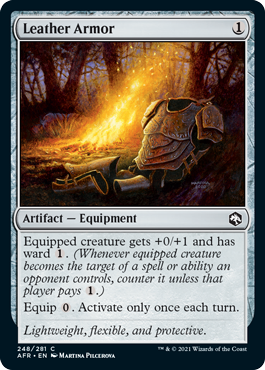
Leather Armor
{1}
Artifact — Equipment
Equipped creature gets +0/+1 and has ward {1}. (Whenever equipped creature becomes the target of a spell or ability an opponent controls, counter it unless that player pays {1}.)
Equip {0}. Activate only once each turn.
- If a creature with ward is equipped with Leather Armor, becoming the target of a spell or ability an opponent controls will cause both ward abilities to trigger.
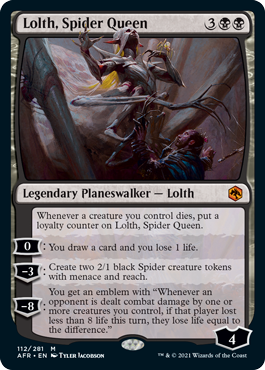
Lolth, Spider Queen
{3}{B}{B}
Legendary Planeswalker — Lolth
4
Whenever a creature you control dies, put a loyalty counter on Lolth, Spider Queen.
0: You draw a card and you lose 1 life.
−3: Create two 2/1 black Spider creature tokens with menace and reach.
−8: You get an emblem with "Whenever an opponent is dealt combat damage by one or more creatures you control, if that player lost less than 8 life this turn, they lose life equal to the difference."
- The emblem's triggered ability checks the total amount of life that opponent has lost over the entire turn after the creatures you control deal combat damage to them. If the amount is 8 or greater, the ability won't trigger.
- Only the total life lost is considered, not any life that opponent may have gained. For example, if an opponent loses 4 life, then gains 5 life, then creatures you control deal 3 combat damage to them, the emblem's ability will trigger and the opponent will lose 1 life.
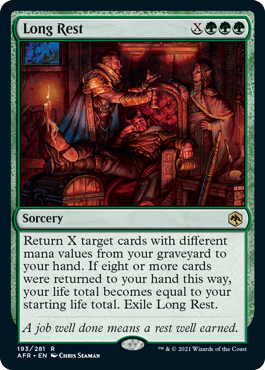
Long Rest
{X}{G}{G}{G}
Sorcery
Return X target cards with different mana values from your graveyard to your hand. If eight or more cards were returned to your hand this way, your life total becomes equal to your starting life total. Exile Long Rest.
- Setting your life total to a specific value counts as gaining or losing life, as appropriate.
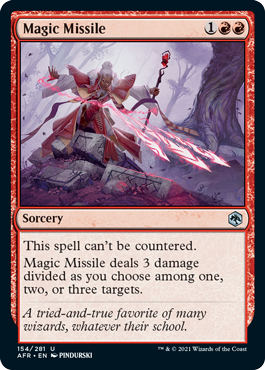
Magic Missile
{1}{R}{R}
Sorcery
This spell can't be countered.
Magic Missile deals 3 damage divided as you choose among one, two, or three targets.
- You divide the damage as you cast Magic Missile. Each target must be assigned at least 1 damage.
- If Magic Missile has one or more targets, and some (but not all) of them are illegal as Magic Missile tries to resolve, the amount of damage dealt to the remaining legal targets doesn't change. If all targets become illegal, Magic Missile won't resolve.
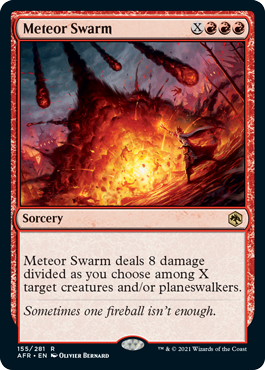
Meteor Swarm
{X}{R}{R}{R}
Sorcery
Meteor Swarm deals 8 damage divided as you choose among X target creatures and/or planeswalkers.
- You divide the damage as you cast Meteor Swarm. Each target must be assigned at least 1 damage. Because there is a maximum of eight targets, X can't be greater than 8.
- If Meteor Swarm has one or more targets, and some (but not all) of them are illegal as Meteor Swarm tries to resolve, the amount of damage dealt to the remaining legal targets doesn't change. If all targets become illegal, Meteor Swarm won't resolve.
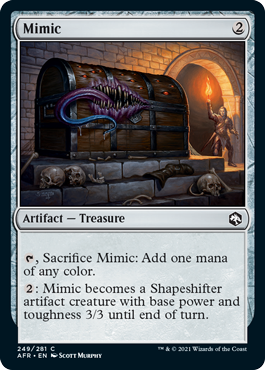
Mimic
{2}
Artifact — Treasure
{T}, Sacrifice Mimic: Add one mana of any color.
{2}: Mimic becomes a Shapeshifter artifact creature with base power and toughness 3/3 until end of turn.
- If an effect refers to a Treasure, it means any Treasure artifact, not just a Treasure artifact token.
- Mimic is still a Treasure after its last ability resolves, but Treasure is an artifact type, never a creature type.
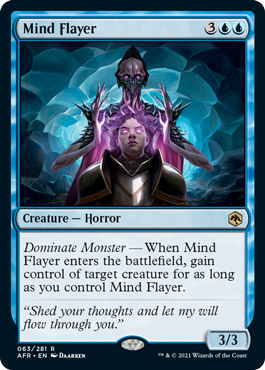
Mind Flayer
{3}{U}{U}
Creature — Horror
3/3
Dominate Monster — When Mind Flayer enters the battlefield, gain control of target creature for as long as you control Mind Flayer.
- If Mind Flayer leaves the battlefield or you lose control of it before its Dominate Monster ability resolves, control of the target creature doesn't change at all.
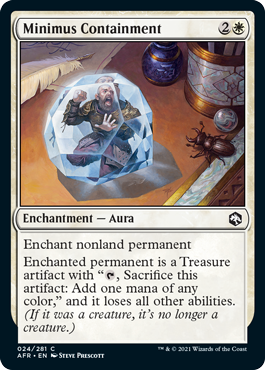
Minimus Containment
{2}{W}
Enchantment — Aura
Enchant nonland permanent
Enchanted permanent is a Treasure artifact with "{T}, Sacrifice this artifact: Add one mana of any color," and it loses all other abilities. (If it was a creature, it's no longer a creature.)
- A creature enchanted with Minimus Containment stops being a creature. Equipment attached to that creature become unattached. Auras attached to that creature will be put into their owner's graveyard (unless they could also enchant a Treasure artifact).
- The enchanted permanent still retains its name, colors, mana cost, and mana value. It isn't a token unless it already was one.
- If an effect refers to a Treasure, it means any Treasure artifact, not just a Treasure artifact token.
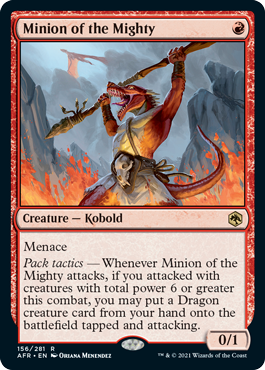
Minion of the Mighty
{R}
Creature — Kobold
0/1
Menace
Pack tactics — Whenever Minion of the Mighty attacks, if you attacked with creatures with total power 6 or greater this combat, you may put a Dragon creature card from your hand onto the battlefield tapped and attacking.
- A Dragon creature card is a creature card with the creature type Dragon, not necessarily a creature card with the word "Dragon" in its name.
- You choose which player or planeswalker the Dragon is attacking as you put it onto the battlefield. It doesn't have to be the same player or planeswalker Minion of the Mighty is attacking.
- The creature card is already tapped and attacking as it's put onto the battlefield. Any abilities that trigger whenever a creature becomes tapped or whenever a creature attacks won't trigger.
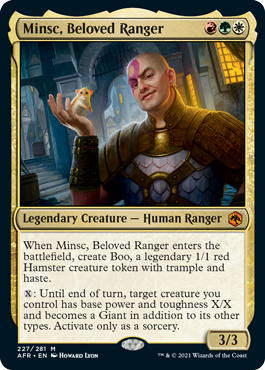
Minsc, Beloved Ranger
{R}{G}{W}
Legendary Creature — Human Ranger
3/3
When Minsc, Beloved Ranger enters the battlefield, create Boo, a legendary 1/1 red Hamster creature token with trample and haste.
{X}: Until end of turn, target creature you control has base power and toughness X/X and becomes a Giant in addition to its other types. Activate only as a sorcery.
- The activated ability will overwrite any previous effects that set the creature's power and toughness to specific values. Effects that otherwise modify the target creature's power and toughness will still apply no matter when they took effect. The same is true for +1/+1 counters.
- Minsc has asked us (repeatedly) to let you know that Boo is the only miniature giant space hamster in the Realms.
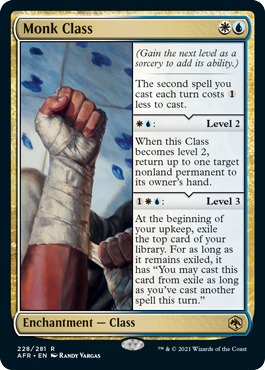
Monk Class
{W}{U}
Enchantment — Class
(Gain the next level as a sorcery to add its ability.)
The second spell you cast each turn costs {1} less to cast.
{W}{U}: Level 2
When this Class becomes level 2, return up to one target nonland permanent to its owner's hand.
{1}{W}{U}: Level 3
At the beginning of your upkeep, exile the top card of your library. For as long as it remains exiled, it has "You may cast this card from exile as long as you've cast another spell this turn."
- If Monk Class is the first spell you cast, the next spell is the second spell and costs {1} less. If Monk Class is the second (or later) spell you cast, its bonus won't apply until the next turn.
- If you have more than one Monk Class on the battlefield, their abilities are cumulative. For example, if you control two Monk Classes, the second spell you cast each turn costs {2} less to cast.
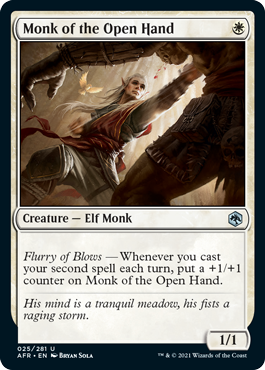
Monk of the Open Hand
{W}
Creature — Elf Monk
1/1
Flurry of Blows — Whenever you cast your second spell each turn, put a +1/+1 counter on Monk of the Open Hand.
- Monk of the Open Hand doesn't need to have been on the battlefield as the first spell was cast. For example, if Monk of the Open Hand is the first spell you cast, and then you cast another spell after the Monk resolved, that spell would cause the Flurry of Blows ability to trigger.
- If Monk of the Open Hand is the second spell you cast in a turn, spells you cast after that point in the same turn will not cause the Flurry of Blows ability to trigger.
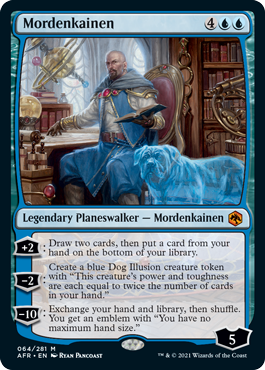
Mordenkainen
{4}{U}{U}
Legendary Planeswalker — Mordenkainen
5
+2: Draw two cards, then put a card from your hand on the bottom of your library.
−2: Create a blue Dog Illusion creature token with "This creature's power and toughness are each equal to twice the number of cards in your hand."
−10: Exchange your hand and library, then shuffle. You get an emblem with "You have no maximum hand size."
- The power and toughness of the Dog Illusion token will change as the number of cards in your hand changes.
- The cards put into your hand due to Mordenkainen's last ability aren't "drawn." Anything that cares about you drawing cards won't notice your hand suddenly becoming very, very well-stocked.
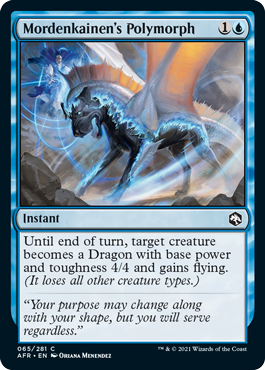
Mordenkainen's Polymorph
{1}{U}
Instant
Until end of turn, target creature becomes a Dragon with base power and toughness 4/4 and gains flying. (It loses all other creature types.)
- The creature doesn't lose any of its abilities.
- Mordenkainen's Polymorph will overwrite any previous effects that set the creature's power and toughness to specific values. Effects that otherwise modify the target creature's power and toughness will still apply no matter when they took effect. The same is true for +1/+1 counters.
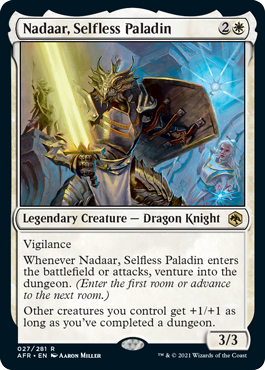
Nadaar, Selfless Paladin
{2}{W}
Legendary Creature — Dragon Knight
3/3
Vigilance
Whenever Nadaar, Selfless Paladin enters the battlefield or attacks, venture into the dungeon. (Enter the first room or advance to the next room.)
Other creatures you control get +1/+1 as long as you've completed a dungeon.
- Nadaar doesn't need to have been on the battlefield when you completed a dungeon for its last ability to function.
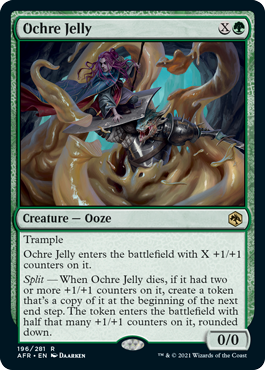
Ochre Jelly
{X}{G}
Creature — Ooze
0/0
Trample
Ochre Jelly enters the battlefield with X +1/+1 counters on it.
Split — When Ochre Jelly dies, if it had two or more +1/+1 counters on it, create a token that's a copy of it at the beginning of the next end step. The token enters the battlefield with half that many +1/+1 counters on it, rounded down.
- For example, if Ochre Jelly had five +1/+1 counters on it when it dies, the token you create will enter the battlefield with two +1/+1 counters on it. When that token dies, the next one you create will enter with one +1/+1 counter on it.
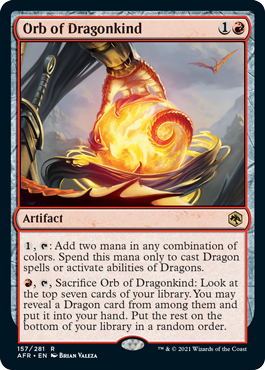
Orb of Dragonkind
{1}{R}
Artifact
{1}, {T}: Add two mana in any combination of colors. Spend this mana only to cast Dragon spells or activate abilities of Dragons.
{R}, {T}, Sacrifice Orb of Dragonkind: Look at the top seven cards of your library. You may reveal a Dragon card from among them and put it into your hand. Put the rest on the bottom of your library in a random order.
- A Dragon card is a card with the creature type Dragon in its type line. Similarly, a creature on the battlefield is a Dragon if it has the Dragon creature type. A card that has "Dragon" in the name (such as Orb of Dragonkind) isn't a Dragon card unless it also has the Dragon creature type.
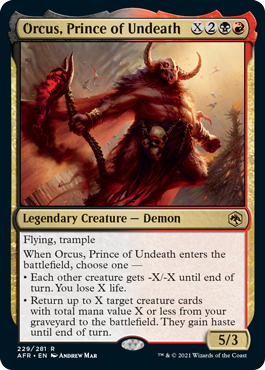
Orcus, Prince of Undeath
{X}{2}{B}{R}
Legendary Creature — Demon
5/3
Flying, trample
When Orcus, Prince of Undeath enters the battlefield, choose one —
• Each other creature gets -X/-X until end of turn. You lose X life.
• Return up to X target creature cards with total mana value X or less from your graveyard to the battlefield. They gain haste until end of turn.
- You may cast Orcus, Prince of Undeath with X equal to 0. If you do, the triggered ability will do nothing as it resolves.
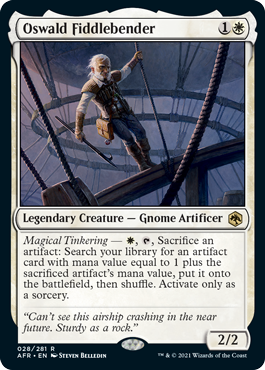
Oswald Fiddlebender
{1}{W}
Legendary Creature — Gnome Artificer
2/2
Magical Tinkering — {W}, {T}, Sacrifice an artifact: Search your library for an artifact card with mana value equal to 1 plus the sacrificed artifact's mana value, put it onto the battlefield, then shuffle. Activate only as a sorcery.
- An artifact's mana value is determined solely by the mana symbols printed in its upper right corner (unless that artifact is copying something else; see below). If its mana cost includes {X}, X is considered to be 0. If it has no mana symbols in its upper right corner (because it's an animated land that's also an artifact, for example), its mana value is 0. Ignore any alternative costs or additional costs (such as kicker) paid when the artifact spell was cast.
- A token has a mana value of 0 unless it's copying something else.
- If an artifact is copying something else, its mana value is the mana value of whatever it's copying.
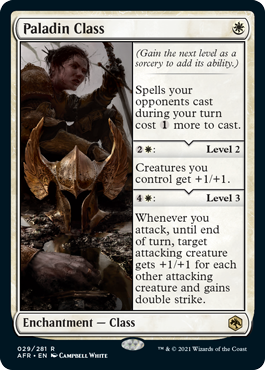
Paladin Class
{W}
Enchantment — Class
(Gain the next level as a sorcery to add its ability.)
Spells your opponents cast during your turn cost {1} more to cast.
{2}{W}: Level 2
Creatures you control get +1/+1.
{4}{W}: Level 3
Whenever you attack, until end of turn, target attacking creature gets +1/+1 for each other attacking creature and gains double strike.
- Additional costs from Paladin Class cards are cumulative. For example, if you control two Paladin Class cards, spells your opponents cast cost {2} more to cast.
- If Paladin Class is level 3 and you attack with exactly one creature, it won't get a power and toughness bonus, but it will get double strike.
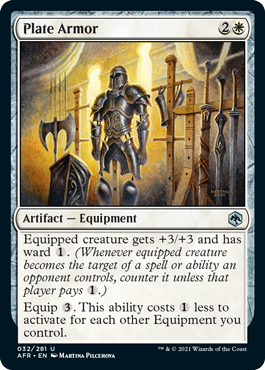
Plate Armor
{2}{W}
Artifact — Equipment
Equipped creature gets +3/+3 and has ward {1}. (Whenever equipped creature becomes the target of a spell or ability an opponent controls, counter it unless that player pays {1}.)
Equip {3}. This ability costs {1} less to activate for each other Equipment you control.
- If a creature with ward is equipped with Plate Armor, becoming the target of a spell or ability an opponent controls will cause both ward abilities to trigger.
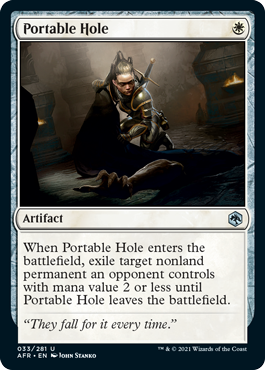
Portable Hole
{W}
Artifact
When Portable Hole enters the battlefield, exile target nonland permanent an opponent controls with mana value 2 or less until Portable Hole leaves the battlefield.
- If Portable Hole leaves the battlefield before its ability resolves, the target permanent won't be exiled.
- Auras attached to the exiled permanent will be put into their owners' graveyards. Any Equipment will become unattached and remain on the battlefield. Any counters on the exiled permanent will cease to exist. When the card returns to the battlefield, it will be a new object with no connection to the card that was exiled.
- If a token is exiled this way, it will cease to exist and won't return to the battlefield.
- If an Aura is exiled this way, its owner chooses what it will enchant as it returns to the battlefield. An Aura put onto the battlefield this way doesn't target anything (so it could be attached to a permanent with shroud, for example), but the Aura's enchant ability restricts what it can be attached to. If the Aura can't legally be attached to anything, it remains in exile for the rest of the game.
- We recommend keeping your Bag of Holding far, far away.
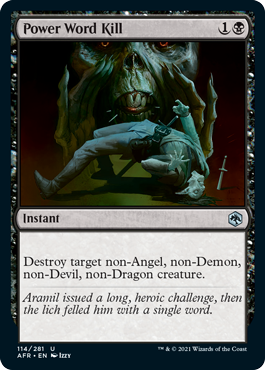
Power Word Kill
{1}{B}
Instant
Destroy target non-Angel, non-Demon, non-Devil, non-Dragon creature.
- A creature is a legal target for Power Word Kill if it doesn't have any of these four creature types. If it has one of these four creature types, it's not a legal target, even if it also has a creature type that's not among these four. For example, a Demon Rogue is not a valid target for this spell.
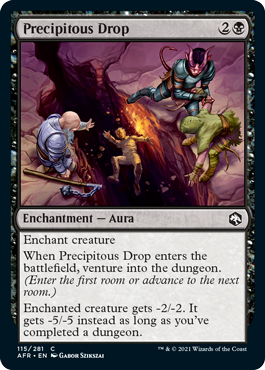
Precipitous Drop
{2}{B}
Enchantment — Aura
Enchant creature
When Precipitous Drop enters the battlefield, venture into the dungeon. (Enter the first room or advance to the next room.)
Enchanted creature gets -2/-2. It gets -5/-5 instead as long as you've completed a dungeon.
- Precipitous Drop does not need to be on the battlefield when you complete the dungeon in order for the enchanted creature to get -5/-5.
- The controller of Precipitous Drop ventures into the dungeon, not the controller of the enchanted creature. Similarly, Precipitous Drop cares whether its controller has completed a dungeon, not whether the creature's controller has completed a dungeon.
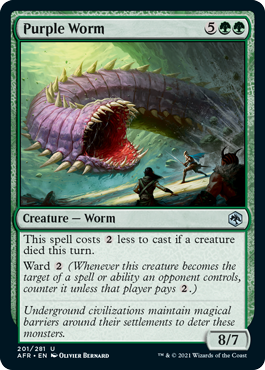
Purple Worm
{5}{G}{G}
Creature — Worm
8/7
This spell costs {2} less to cast if a creature died this turn.
Ward {2} (Whenever this creature becomes the target of a spell or ability an opponent controls, counter it unless that player pays {2}.)
- Purple Worm's first ability will never reduce its cost more than {2}, no matter how many creatures died this turn.
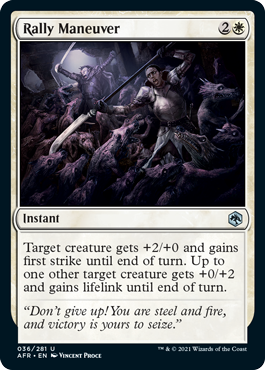
Rally Maneuver
{2}{W}
Instant
Target creature gets +2/+0 and gains first strike until end of turn. Up to one other target creature gets +0/+2 and gains lifelink until end of turn.
- You cannot target the same creature twice.
- The first target will always get +2/+0 and first strike. If you target only one creature, you cannot choose to give it +0/+2 and lifelink.
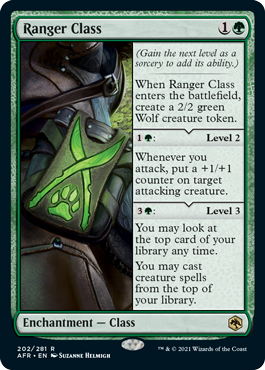
Ranger Class
{1}{G}
Enchantment — Class
(Gain the next level as a sorcery to add its ability.)
When Ranger Class enters the battlefield, create a 2/2 green Wolf creature token.
{1}{G}: Level 2
Whenever you attack, put a +1/+1 counter on target attacking creature.
{3}{G}: Level 3
You may look at the top card of your library any time.
You may cast creature spells from the top of your library.
- The triggered ability Ranger Class gets at level 2 can trigger only once per combat, no matter how many creatures you attack with.
- If Ranger Class is level 3, you can look at the top card of your library whenever you want (with one restriction; see below), even if you don't have priority. This action doesn't use the stack. Knowing what that card is becomes part of the information you have access to, just like you can look at the cards in your hand.
- If the top card of your library changes while you're casting a spell, playing a land, or activating an ability, you can't look at the new top card until you finish doing so. This means that if you cast a spell from the top of your library, you can't look at the next one until you're done paying for that spell.
- Ranger Class doesn't change when you can cast creature spells. Normally, this means during your main phase when the stack is empty, although flash may change this.
- You'll still pay all costs for the spell, including additional costs. You may also pay alternative costs if any are available.
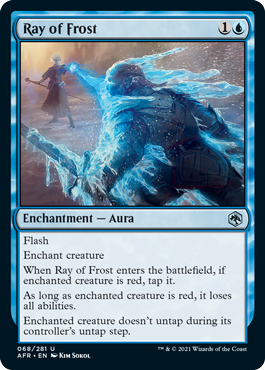
Ray of Frost
{1}{U}
Enchantment — Aura
Flash
Enchant creature
When Ray of Frost enters the battlefield, if enchanted creature is red, tap it.
As long as enchanted creature is red, it loses all abilities.
Enchanted creature doesn't untap during its controller's untap step.
- If the enchanted creature is red (or if it becomes red), it loses all abilities that it had prior to the time Ray of Frost became attached to it. It will keep any abilities that were granted to it after Ray of Frost became attached to it.
- If the enchanted creature is red and has a characteristic-defining ability that specifies its types or colors, that ability will still have its effect because it's applied before the creature loses the ability.
- If the enchanted creature is red and has a characteristic-defining ability that specifies its power and/or toughness, that ability will not have its effect. In that case, its power and/or toughness (as appropriate) become 0.
- Some noncreature permanents, such as Grand Master of Flowers, become creatures because of a static ability they have. If Ray of Frost becomes attached to such a creature and that creature is red or becomes red, that permanent will remain a creature even though it loses the ability that is making it a creature after that ability applies.
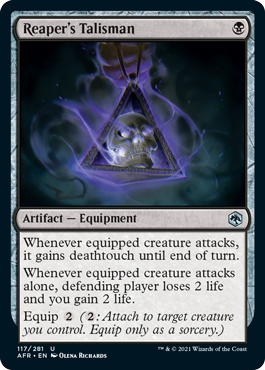
Reaper's Talisman
{B}
Artifact — Equipment
Whenever equipped creature attacks, it gains deathtouch until end of turn.
Whenever equipped creature attacks alone, defending player loses 2 life and you gain 2 life.
Equip {2} ({2}: Attach to target creature you control. Equip only as a sorcery.)
- When the equipped creature attacks alone, it causes both abilities to trigger.
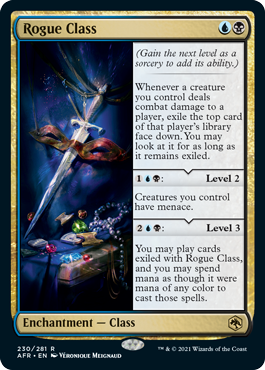
Rogue Class
{U}{B}
Enchantment — Class
(Gain the next level as a sorcery to add its ability.)
Whenever a creature you control deals combat damage to a player, exile the top card of that player's library face down. You may look at it for as long as it remains exiled.
{1}{U}{B}: Level 2
Creatures you control have menace.
{2}{U}{B}: Level 3
You may play cards exiled with Rogue Class, and you may spend mana as though it were mana of any color to cast those spells.
- If you have more than one Rogue Class on the battlefield, they each track exiled cards individually.
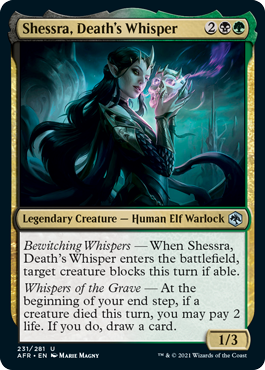
Shessra, Death's Whisper
{2}{B}{G}
Legendary Creature — Human Elf Warlock
1/3
Bewitching Whispers — When Shessra, Death's Whisper enters the battlefield, target creature blocks this turn if able.
Whispers of the Grave — At the beginning of your end step, if a creature died this turn, you may pay 2 life. If you do, draw a card.
- If the creature affected by the Bewitching Whispers ability is tapped or is affected by a spell or ability that says it can't block, then it doesn't block. If there's a cost associated with having that creature block, its controller isn't forced to pay that cost, so it doesn't have to block in that case either.
- Shessra, Death's Whisper's last ability will trigger only once during your end step, no matter how many creatures died this turn. However, if no creatures have died so far this turn as the end step begins, the ability won't trigger at all. It's not possible to cause a creature to die during the end step in time to have the ability trigger.
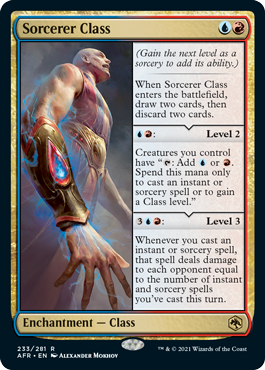
Sorcerer Class
{U}{R}
Enchantment — Class
(Gain the next level as a sorcery to add its ability.)
When Sorcerer Class enters the battlefield, draw two cards, then discard two cards.
{U}{R}: Level 2
Creatures you control have "{T}: Add {U} or {R}. Spend this mana only to cast an instant or sorcery spell or to gain a Class level."
{3}{U}{R}: Level 3
Whenever you cast an instant or sorcery spell, that spell deals damage to each opponent equal to the number of instant and sorcery spells you've cast this turn.
- The last ability counts the number of spells that were cast before it resolved, not the number of spells that were cast before it was placed on the stack. For example, if you cast a sorcery and then respond to Sorcerer Class's triggered ability by casting an instant, both triggered abilities will deal 2 damage when they resolve.
- If the spell that causes the last ability to trigger is countered or is otherwise no longer on the stack as the ability resolves, it will still deal damage. Last known information will be used to do determine the effects of that damage. For example, if the spell has lifelink, you will still gain life when it deals damage, even if the spell was countered.
- Copying a spell won't cause Sorcerer Class's level 3 ability to trigger and won't be counted toward the number of spells you've cast during the turn. However, if an effect copies a card and you cast the copy, that will count for both of those things.
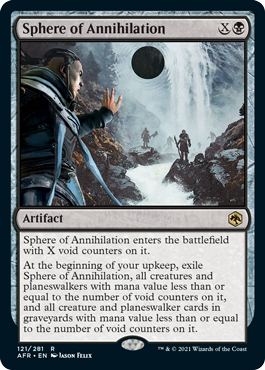
Sphere of Annihilation
{X}{B}
Artifact
Sphere of Annihilation enters the battlefield with X void counters on it.
At the beginning of your upkeep, exile Sphere of Annihilation, all creatures and planeswalkers with mana value less than or equal to the number of void counters on it, and all creature and planeswalker cards in graveyards with mana value less than or equal to the number of void counters on it.
- If a permanent on the battlefield or a card in a graveyard has {X} in its mana cost, X is 0 when determining that card's mana value.
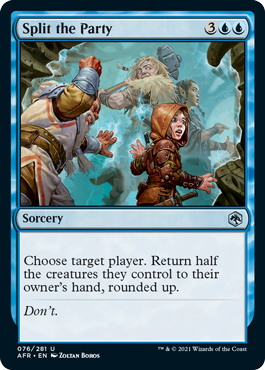
Split the Party
{3}{U}{U}
Sorcery
Choose target player. Return half the creatures they control to their owner's hand, rounded up.
- The player that controls Split the Party chooses which creatures to return to their owner's hand as it resolves.
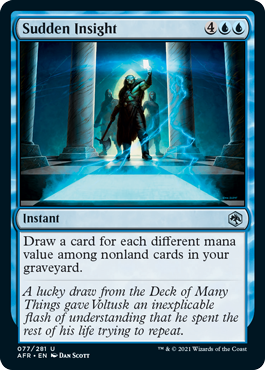
Sudden Insight
{4}{U}{U}
Instant
Draw a card for each different mana value among nonland cards in your graveyard.
- If a card in your graveyard has {X} in its mana cost, X is 0 when determining that card's mana value.
- Although land cards aren't considered, nonland cards with mana value 0 are. For example if the cards in your graveyard are an artifact card with mana cost {X} and a sorcery card with mana cost {2}{U}, you'll draw two cards.
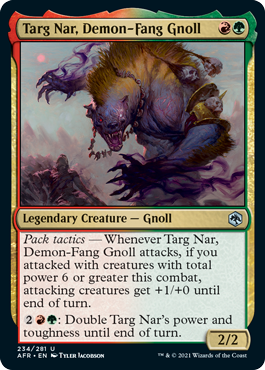
Targ Nar, Demon-Fang Gnoll
{R}{G}
Legendary Creature — Gnoll
2/2
Pack tactics — Whenever Targ Nar, Demon-Fang Gnoll attacks, if you attacked with creatures with total power 6 or greater this combat, attacking creatures get +1/+0 until end of turn.
{2}{R}{G}: Double Targ Nar's power and toughness until end of turn.
- If an effect instructs you to "double" a creature's power, that creature gets +X/+0, where X is its power as that effect begins to apply. The same is true for toughness.
- If a creature's power is less than 0 when it's doubled, instead that creature gets -X/-0, where X is how much less than 0 its power is. For example, if an effect has given a 2/2 creature -4/-0 so that it's a -2/2 creature, doubling its power and toughness gives it -2/+2, and it becomes a -4/4 creature.
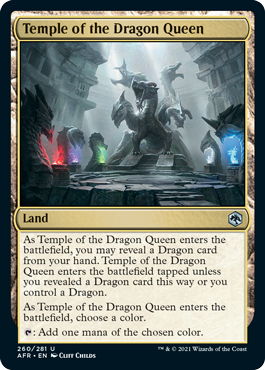
Temple of the Dragon Queen
Land
As Temple of the Dragon Queen enters the battlefield, you may reveal a Dragon card from your hand. Temple of the Dragon Queen enters the battlefield tapped unless you revealed a Dragon card this way or you control a Dragon.
As Temple of the Dragon Queen enters the battlefield, choose a color.
{T}: Add one mana of the chosen color.
- A Dragon card is a card with the creature type Dragon in its type line. Similarly, a creature on the battlefield is a Dragon if it has the Dragon creature type. A card that has "Dragon" in the name (such as Temple of the Dragon Queen) isn't a Dragon card unless it also has the Dragon creature type.
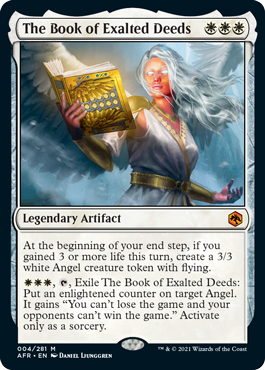
The Book of Exalted Deeds
{W}{W}{W}
Legendary Artifact
At the beginning of your end step, if you gained 3 or more life this turn, create a 3/3 white Angel creature token with flying.
{W}{W}{W}, {T}, Exile The Book of Exalted Deeds: Put an enlightened counter on target Angel. It gains "You can't lose the game and your opponents can't win the game." Activate only as a sorcery.
- The enlightenment counter placed by the last ability serves as a memory aid. It isn't connected to the granted ability. The Angel keeps that ability even if it loses the counter. Similarly, if the counter is somehow moved to another permanent, that permanent doesn't gain the ability.
- The Angel won't lose the ability it gains if it stops being an Angel after the ability resolves.
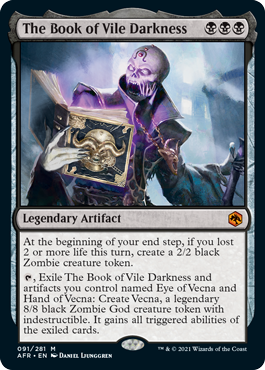
The Book of Vile Darkness
{B}{B}{B}
Legendary Artifact
At the beginning of your end step, if you lost 2 or more life this turn, create a 2/2 black Zombie creature token.
{T}, Exile The Book of Vile Darkness and artifacts you control named Eye of Vecna and Hand of Vecna: Create Vecna, a legendary 8/8 black Zombie God creature token with indestructible and all triggered abilities of the exiled cards.
- The Book of Vile Darkness has received an update. The current Oracle text appears above. Specifically, the triggered abilities that Vecna gains are part of its copiable values. This means any enters-the-battlefield triggered abilities it gains (such as the one from Eye of Vecna) will trigger.
- In the vast majority of cases, Vecna will gain the triggered ability printed on Hand of Vecna and the two triggered abilities printed on Eye of Vecna.
- In some strange cases, you might make something into a copy of the Eye and/or Hand of Vecna and then exile that copy to activate The Book of Vile Darkness's ability. The ability that creates Vecna will look at the cards in exile, not the permanents on the battlefield, so it's possible to have Vecna gain different triggered abilities.
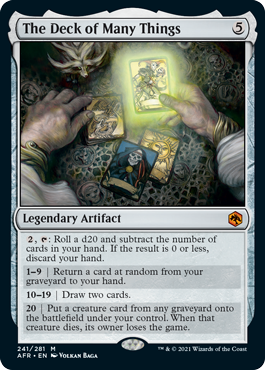
The Deck of Many Things
{5}
Legendary Artifact
{2}, {T}: Roll a d20 and subtract the number of cards in your hand. If the result is 0 or less, discard your hand.
1–9 | Return a card at random from your graveyard to your hand.
10–19 | Draw two cards.
20 | Put a creature card from any graveyard onto the battlefield under your control. When that creature dies, its owner loses the game.
- Like all results tables, the one on The Deck of Many Things cares about the result of the die roll after any adjustments, such as subtracting the number of cards in your hand. This means it's usually not possible to get a result of 20 unless you have no cards in hand.
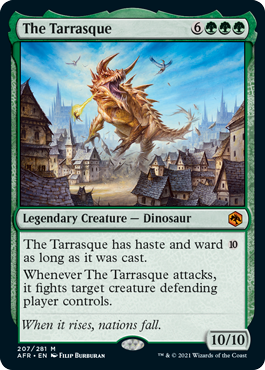
The Tarrasque
{6}{G}{G}{G}
Legendary Creature — Dinosaur
10/10
The Tarrasque has haste and ward {10} as long as it was cast.
Whenever The Tarrasque attacks, it fights target creature defending player controls.
- The Tarrasque will have haste and ward {10} even if it was cast from a zone other than your hand. May we suggest the command zone?
- Fighting is not optional. If there is at least one legal target for The Tarrasque's last ability, it must fight.
- The fight happens in the declare attackers step before blockers are declared. Unless the creature it is fighting survives, that creature won't be able to block that combat.
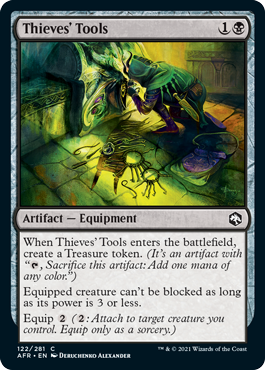
Thieves' Tools
{1}{B}
Artifact — Equipment
When Thieves' Tools enters the battlefield, create a Treasure token. (It's an artifact with "{T}, Sacrifice this artifact: Add one mana of any color.")
Equipped creature can't be blocked as long as its power is 3 or less.
Equip {2} ({2}: Attach to target creature you control. Equip only as a sorcery.)
- The equipped creature's power is checked only during the declare blockers step. If its power becomes greater than 3 after blockers are declared, it still can't be blocked. Similarly, if its power becomes 3 or less after it's been blocked, this won't make it unblocked.
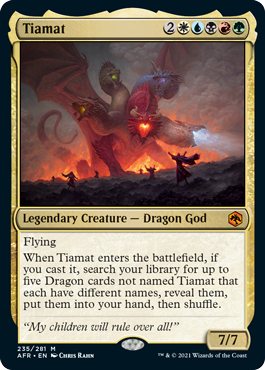
Tiamat
{2}{W}{U}{B}{R}{G}
Legendary Creature — Dragon God
7/7
Flying
When Tiamat enters the battlefield, if you cast it, search your library for up to five Dragon cards not named Tiamat that each have different names, reveal them, put them into your hand, then shuffle.
- Tiamat's enters-the-battlefield ability will trigger if you cast Tiamat from any zone, not just from your hand. Still thinking command zone over here.
- A Dragon card is a card with the creature type Dragon in its type line. A card that has "Dragon" in the name (such as Dragon's Disciple) isn't a Dragon card unless it also has the Dragon creature type.
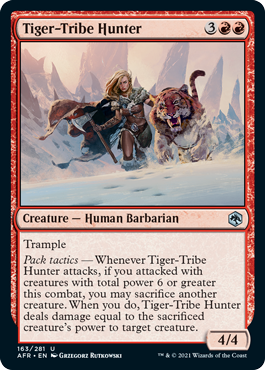
Tiger-Tribe Hunter
{3}{R}{R}
Creature — Human Barbarian
4/4
Trample
Pack tactics — Whenever Tiger-Tribe Hunter attacks, if you attacked with creatures with total power 6 or greater this combat, you may sacrifice another creature. When you do, Tiger-Tribe Hunter deals damage equal to the sacrificed creature's power to target creature.
- The pack tactics ability goes on the stack without a target. If you sacrifice another creature as it resolves, the reflexive triggered ability will trigger and choose a target for it at that time.
- Use the sacrificed creature's power as it last existed on the battlefield to determine how much damage is dealt.
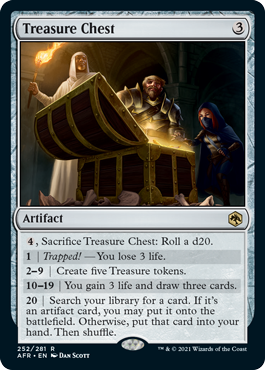
Treasure Chest
{3}
Artifact
{4}, Sacrifice Treasure Chest: Roll a d20.
1 | Trapped! — You lose 3 life.
2–9 | Create five Treasure tokens.
10–19 | You gain 3 life and draw three cards.
20 | Search your library for a card. If it's an artifact card, you may put it onto the battlefield. Otherwise, put that card into your hand. Then shuffle.
- The "otherwise" in the last ability refers to whether or not you put it onto the battlefield, not whether or not it's an artifact card. You may put it into your hand even if it's an artifact card.
- If you choose to put the card into your hand, you don't need to reveal it.
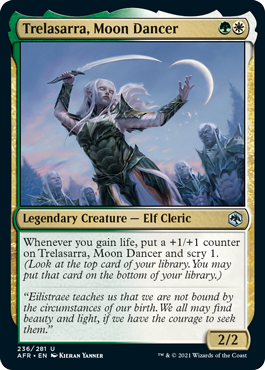
Trelasarra, Moon Dancer
{G}{W}
Legendary Creature — Elf Cleric
2/2
Whenever you gain life, put a +1/+1 counter on Trelasarra, Moon Dancer and scry 1. (Look at the top card of your library. You may put that card on the bottom of your library.)
- If you gain life at the same time Trelasarra, Moon Dancer is dealt lethal damage, it dies before its triggered ability can put a +1/+1 counter on it, but you will still scry 1.
- An ability that triggers "whenever you gain life" triggers just once for each life gain event, no matter how much life you gain.
- Each creature with lifelink dealing combat damage causes a separate life gain event. For example, if two creatures you control with lifelink deal combat damage at the same time, a "whenever you gain life" ability will trigger twice. However, if a single creature you control with lifelink deals combat damage to multiple creatures, players, and/or planeswalkers at the same time (perhaps because it has trample or was blocked by more than one creature), the ability will trigger only once.
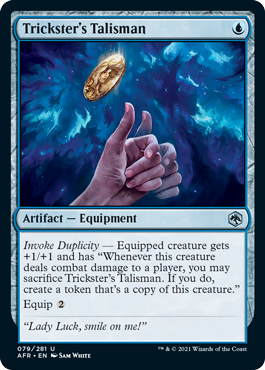
Trickster's Talisman
{U}
Artifact — Equipment
Invoke Duplicity — Equipped creature gets +1/+1 and has "Whenever this creature deals combat damage to a player, you may sacrifice Trickster's Talisman. If you do, create a token that's a copy of this creature."
Equip {2}
- If your Trickster's Talisman is somehow equipped to a creature another player controls, that player will not be able to sacrifice Trickster's Talisman as the triggered ability resolves as they don't control it.
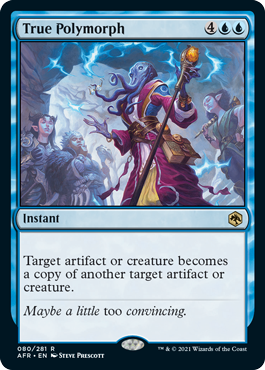
True Polymorph
{4}{U}{U}
Instant
Target artifact or creature becomes a copy of another target artifact or creature.
- True Polymorph's effect does not have a duration. The copy effect it creates lasts as long as the first target remains on the battlefield.
- True Polymorph causes the first target permanent to copy the printed values of the second target permanent, including any copy and mutate effects that have been applied to it. It won't copy counters on that permanent or effects that have changed its power, toughness, types, color, and so on.
- If the first target permanent copies a permanent that's copying something else, it will become whatever the second target is copying.
- If an effect begins to apply to the first target permanent before it becomes a copy of another permanent, that effect will continue to apply.
- If the first target becomes a creature the same turn it entered the battlefield, you can't attack with it or use any of its {T} abilities unless it has haste.
- If the target permanent is an Equipment attached to a creature and it becomes a copy of a non-Equipment permanent, it becomes unattached. If it becomes a copy of an Equipment, it remains attached.
- If either target is an illegal target for True Polymorph as it resolves, the spell will do nothing.
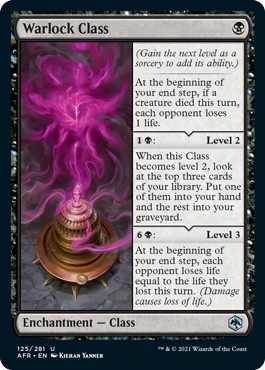
Warlock Class
{B}
Enchantment — Class
(Gain the next level as a sorcery to add its ability.)
At the beginning of your end step, if a creature died this turn, each opponent loses 1 life.
{1}{B}: Level 2
When this Class becomes level 2, look at the top three cards of your library. Put one of them into your hand and the rest into your graveyard.
{6}{B}: Level 3
At the beginning of your end step, each opponent loses life equal to the life they lost this turn. (Damage causes loss of life.)
- Warlock Class does not need to have been on the battlefield when the creature died for its first ability. For example, if a creature died in combat and you cast Warlock Class in your second main phase, the ability will trigger at the beginning of your end step.
- Warlock Class's first ability will trigger only once during your end step, no matter how many creatures died this turn. However, if no creatures have died so far this turn as the end step begins, the ability won't trigger at all. It's not possible to cause a creature to die during the end step in time to have the ability trigger.
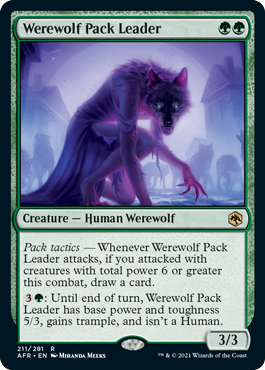
Werewolf Pack Leader
{G}{G}
Creature — Human Werewolf
3/3
Pack tactics — Whenever Werewolf Pack Leader attacks, if you attacked with creatures with total power 6 or greater this combat, draw a card.
{3}{G}: Until end of turn, Werewolf Pack Leader has base power and toughness 5/3, gains trample, and isn't a Human.
- The last ability will overwrite any previous effects that set Werewolf Pack Leader's power and toughness to specific numbers. Effects that otherwise modify its power and toughness will still apply no matter when they took effect. The same is true for +1/+1 counters. For example, if you cast a spell that gives Werewolf Pack Leader +1/+1, after that resolves it is a 4/4 creature. If you then activate its last ability, it will be a 6/4 creature.
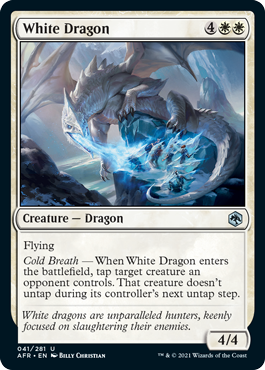
White Dragon
{4}{W}{W}
Creature — Dragon
4/4
Flying
Cold Breath — When White Dragon enters the battlefield, tap target creature an opponent controls. That creature doesn't untap during its controller's next untap step.
- White Dragon's Cold Breath ability can target a tapped creature. That creature won't untap during its controller's next untap step.
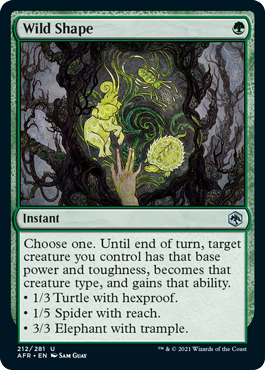
Wild Shape
{G}
Instant
Choose one. Until end of turn, target creature you control has that base power and toughness, becomes that creature type, and gains that ability.
• 1/3 Turtle with hexproof.
• 1/5 Spider with reach.
• 3/3 Elephant with trample.
- Both the target creature and the mode are chosen on announcement. You can't choose a different form if something changes in response to the spell.
- The creature loses all other creature types, but it retains its abilities. Wild Shape will overwrite any previous effects that set the creature's power and toughness to specific numbers. Effects that otherwise modify the target creature's power and toughness will still apply no matter when they took effect. The same is true for +1/+1 counters.
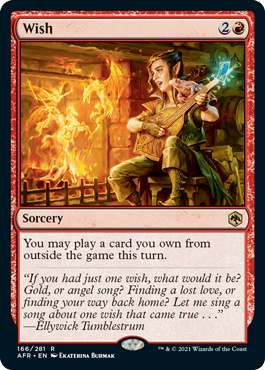
Wish
{2}{R}
Sorcery
You may play a card you own from outside the game this turn.
- You choose the card to play from outside the game at the time you are playing it, not at the time Wish resolves.
- You still need to pay all costs to play a card this way, and you must follow all normal timing rules.
- In a casual game, a card you choose from outside the game comes from your personal collection. In a tournament event, a card you choose from outside the game must come from your sideboard. In Limited events, your sideboard includes an arbitrary number of basic lands. You may look at your sideboard at any time.
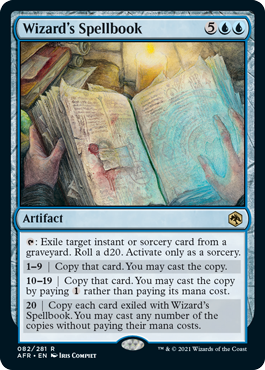
Wizard's Spellbook
{5}{U}{U}
Artifact
{T}: Exile target instant or sorcery card from a graveyard. Roll a d20. Activate only as a sorcery.
1–9 | Copy that card. You may cast the copy.
10–19 | Copy that card. You may cast the copy by paying {1} rather than paying its mana cost.
20 | Copy each card exiled with Wizard's Spellbook. You may cast any number of the copies without paying their mana costs.
- If your result is 1–9, you must still pay all costs to cast the copy. You may pay any additional or alternative costs the spell has. If it has any mandatory additional costs, those must be paid.
- If your result is 10–19, you may pay {1} instead of its mana cost. You cannot pay its regular mana cost or any alternative costs the copy has. You may pay any additional costs and must pay mandatory additional costs.
- If your result is 20, you may cast the copies without paying their mana costs. You cannot pay their regular mana costs or any alternative costs the copies have. You may pay any additional costs and must pay mandatory additional costs. You may cast the copies in any order you choose.
- In all cases, any copies you don't cast cease to exist after the ability is finished resolving.
- If you control multiple copies of Wizard's Spellbook, each one tracks the cards it has exiled separately.
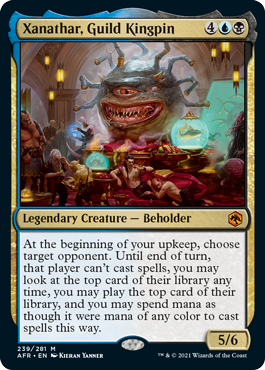
Xanathar, Guild Kingpin
{4}{U}{B}
Legendary Creature — Beholder
5/6
At the beginning of your upkeep, choose target opponent. Until end of turn, that player can't cast spells, you may look at the top card of their library any time, you may play the top card of their library, and you may spend mana as though it were mana of any color to cast spells this way.
- The target opponent may still cast spells in response to Xanathar, Guild Kingpin's ability in your upkeep. If that player has somehow become an illegal target for the ability as it tries to resolve, the ability does nothing. They may cast spells and you cannot look at or play the top card of their library.
- During your turn, you can look at the top card of the chosen opponent's library whenever you want (with one restriction; see below), even if you don't have priority. This action doesn't use the stack. Knowing what that card is becomes part of the information you have access to, just like you can look at the cards in your hand.
- If the top card of that library changes while you're casting a spell, playing a land, or activating an ability, you can't look at the new top card until you finish doing so. This means that if you cast a spell from the top of that library, you can't look at the next card until you're done paying for that spell.
- Xanathar doesn't change when you can cast spells or play lands. You must still follow all normal timing rules and land play limits.
- You'll still pay all costs for spells cast this way, including additional costs. You may also pay alternative costs if any are available.
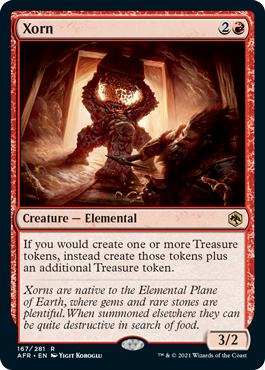
Xorn
{2}{R}
Creature — Elemental
3/2
If you would create one or more Treasure tokens, instead create those tokens plus an additional Treasure token.
- If you control multiple copies of Xorn, you'll create that many additional Treasure tokens.
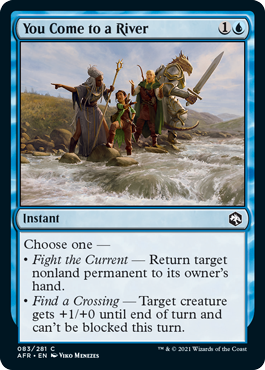
You Come to a River
{1}{U}
Instant
Choose one —
• Fight the Current — Return target nonland permanent to its owner's hand.
• Find a Crossing — Target creature gets +1/+0 until end of turn and can't be blocked this turn.
- Casting this spell and choosing the Find a Crossing mode targeting an attacking creature that has already been blocked won't change or undo that block. It will still get the +1/+0 though.
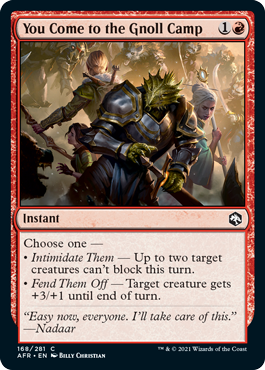
You Come to the Gnoll Camp
{1}{R}
Instant
Choose one —
• Intimidate Them — Up to two target creatures can't block this turn.
• Fend Them Off — Target creature gets +3/+1 until end of turn.
- Casting this spell and choosing the Intimidate Them mode after blockers have been declared won't change or undo any blocks.
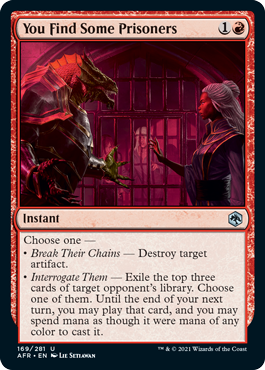
You Find Some Prisoners
{1}{R}
Instant
Choose one —
• Break Their Chains — Destroy target artifact.
• Interrogate Them — Exile the top three cards of target opponent's library. Choose one of them. Until the end of your next turn, you may play that card, and you may spend mana as though it were mana of any color to cast it.
- For the Interrogate Them mode, the cards you didn't choose remain in exile. If you don't play the chosen card, it also remains in exile.
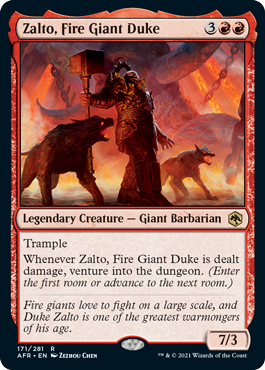
Zalto, Fire Giant Duke
{3}{R}{R}
Legendary Creature — Giant Barbarian
7/3
Trample
Whenever Zalto, Fire Giant Duke is dealt damage, venture into the dungeon. (Enter the first room or advance to the next room.)
- If Zalto is dealt lethal damage, you will still get to venture into the dungeon.
- If Zalto is dealt damage by multiple sources at the same time (usually creatures blocking it), you will only venture into the dungeon once.
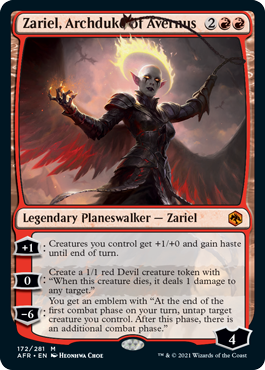
Zariel, Archduke of Avernus
{2}{R}{R}
Legendary Planeswalker — Zariel
4
+1: Creatures you control get +1/+0 and gain haste until end of turn.
0: Create a 1/1 red Devil creature token with "When this creature dies, it deals 1 damage to any target."
−6: You get an emblem with "At the end of the first combat phase on your turn, untap target creature you control. After this phase, there is an additional combat phase."
- There is no main phase between the combat phases. You move from the first combat phase directly into the second combat phase.
- The ability of the emblem can target any creature you control, not just one that's tapped.
- If the target of the emblem's ability becomes an illegal target by the time the ability tries to resolve, the ability won't resolve and none of its effects will happen. You won't get an additional combat phase.
- If you have more than one of Zariel's emblem, the abilities will each trigger at the end of the first combat phase on your turn. You can choose the same creature as the target of each ability. Those targets will untap before any additional combats. No creatures will untap between the first additional combat and the second additional combat (or between the second and third, and so on, and wow, how long was Zariel under your control?!)
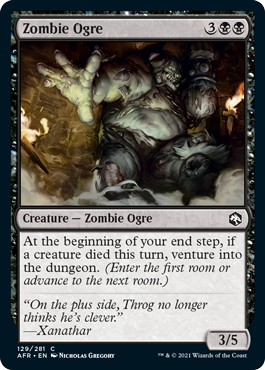
Zombie Ogre
{3}{B}{B}
Creature — Zombie Ogre
3/5
At the beginning of your end step, if a creature died this turn, venture into the dungeon. (Enter the first room or advance to the next room.)
- Zombie Ogre doesn't need to have been on the battlefield at the time the creature died for its ability to function.
- Zombie Ogre's ability will trigger only once during your end step, no matter how many creatures died this turn. However, if no creatures have died so far this turn as the end step begins, the ability won't trigger at all. It's not possible to cause a creature to die during the end step in time to have the ability trigger.
ADVENTURES IN THE FORGOTTEN REALMS COMMANDER CARD-SPECIFIC NOTES
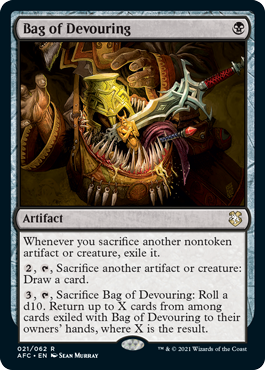
Bag of Devouring
{B}
Artifact
Whenever you sacrifice another nontoken artifact or creature, exile it.
{2}, {T}, Sacrifice another artifact or creature: Draw a card.
{3}, {T}, Sacrifice Bag of Devouring: Roll a d10. Return up to X cards from among cards exiled with Bag of Devouring to their owners' hands, where X is the result.
- Bag of Devouring's first ability is a triggered ability that happens when you sacrifice permanents, but you can't just sacrifice permanents whenever you want. You need to have some other means to do so, such as activating Bag of Devouring's second ability.
- If the card you sacrifice isn't still in the graveyard as the first ability resolves, it won't be exiled. It won't be a card exiled with Bag of Devouring for the third ability.
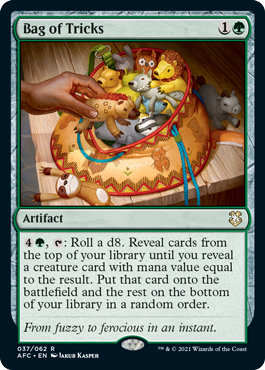
Bag of Tricks
{1}{G}
Artifact
{4}{G}, {T}: Roll a d8. Reveal cards from the top of your library until you reveal a creature card with mana value equal to the result. Put that card onto the battlefield and the rest on the bottom of your library in a random order.
- If you do not have a creature card in your library with mana value equal to the result, you will reveal your entire library and then put the entire library back in a random order.
- Even if you reveal the entire library this way, putting it on the bottom in a random order doesn't count as "shuffling" the library.
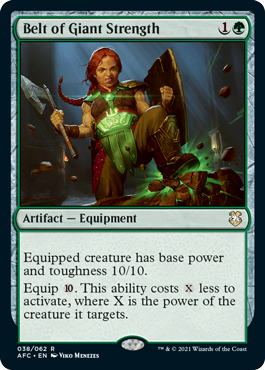
Belt of Giant Strength
{1}{G}
Artifact — Equipment
Equipped creature has base power and toughness 10/10.
Equip {10}. This ability costs {X} less to activate, where X is the power of the creature it targets.
- Belt of Giant Strength will overwrite any previous effects that set the creature's power and toughness to specific numbers. Effects that otherwise modify the equipped creature's power and toughness will still apply no matter when they took effect. The same is true for +1/+1 counters.
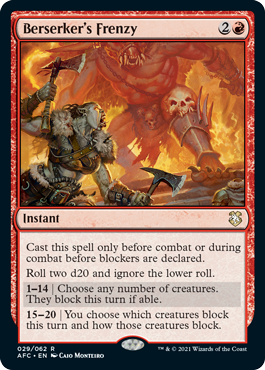
Berserker's Frenzy
{2}{R}
Instant
Cast this spell only before combat or during combat before blockers are declared.
Roll two d20 and ignore the lower roll.
1–14 | Choose any number of creatures. They block this turn if able.
15–20 | You choose which creatures block this turn and how those creatures block.
- If you roll doubles, ignore one of the rolls and use the result of the other.
- An ignored roll effectively never happens. No abilities will trigger because of an ignored roll.
- When choosing blocks for creatures you don't control, you must still make legal choices. For example, you can't choose to have a creature without flying or reach block a creature with flying.
- If there's a cost associated with having a creature block and you choose for that creature to block, its controller can choose to pay that cost or not. If that player doesn't pay that cost, you must propose a new set of blocking creatures.
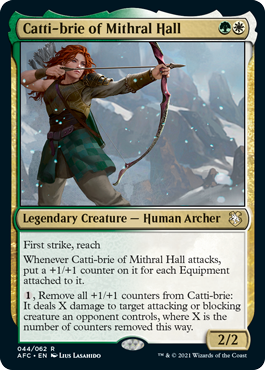
Catti-brie of Mithral Hall
{G}{W}
Legendary Creature — Human Archer
2/2
First strike, reach
Whenever Catti-brie of Mithral Hall attacks, put a +1/+1 counter on it for each Equipment attached to it.
{1}, Remove all +1/+1 counters from Catti-brie: It deals X damage to target attacking or blocking creature an opponent controls, where X is the number of counters removed this way.
- If a blocking creature is destroyed due to damage dealt this way, the creature it was blocking is still considered blocked. Unless the attacking creature has trample, it won't deal any damage to the player or planeswalker it is attacking.
- If Catti-brie of Mithral Hall has no counters, you can still activate the last ability. This won't deal any damage, but it will count as targeting something for abilities like that of Fey Steed.
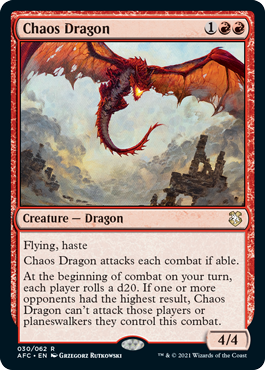
Chaos Dragon
{1}{R}{R}
Creature — Dragon
4/4
Flying, haste
Chaos Dragon attacks each combat if able.
At the beginning of combat on your turn, each player rolls a d20. If one or more opponents had the highest result, Chaos Dragon can't attack those players or planeswalkers they control this combat.
- You roll a d20 as well as your opponents. If you had a higher result than all of your opponents, Chaos Dragon won't have any restrictions on who it may attack.
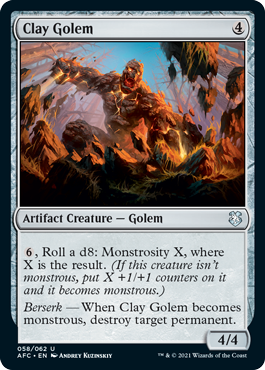
Clay Golem
{4}
Artifact Creature — Golem
4/4
{6}, Roll a d8: Monstrosity X, where X is the result. (If this creature isn't monstrous, put X +1/+1 counters on it and it becomes monstrous.)
Berserk — When Clay Golem becomes monstrous, destroy target permanent.
- Once a creature becomes monstrous, it can't become monstrous again. If the creature is already monstrous when the monstrosity ability resolves, nothing happens. However, because rolling the d8 is part of the cost of activating the ability, if you don't like what you rolled and have another {6} handy, you can respond to the ability by activating the ability again. Good luck!
- Monstrous isn't an ability that a creature has. It's just something true about that creature. If the creature stops being a creature or loses its abilities, it will continue to be monstrous.
- An ability that triggers when a creature becomes monstrous won't trigger if that creature isn't on the battlefield when its monstrosity ability resolves.
- You can activate Clay Golem's first ability even after it has become monstrous. It won't become monstrous again and you won't put any counters on it, but you will roll a die to activate the ability, which may cause abilities of other permanents to trigger.
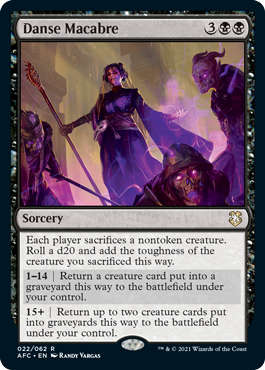
Danse Macabre
{3}{B}{B}
Sorcery
Each player sacrifices a nontoken creature. Roll a d20 and add the toughness of the creature you sacrificed this way.
1–14 | Return a creature card put into a graveyard this way to the battlefield under your control.
15+ | Return up to two creature cards put into graveyards this way to the battlefield under your control.
- Starting with you and continuing in turn order, each player will choose which creature they will sacrifice. They will know the choices made by players before them in this order when they make that choice. The creatures are all sacrificed at the same time.
- All creatures are chosen and sacrificed before the die is rolled. You don't get to see what the result of the die roll is before choosing which creature to sacrifice.
- You add only the toughness of the creature you sacrificed this way, not the toughness of any creatures your opponent sacrificed. If you didn't sacrifice a creature this way, you will still roll a d20, but you will not add anything to the roll.
- If a player sacrifices their commander this way, they won't be able to choose whether to put it into the command zone until after Danse Macabre has finished resolving. Notably, this means that the sacrificed commander is a legal choice for the spell's controller to return to the battlefield. If they choose it this way, it will stay on the battlefield under their control.
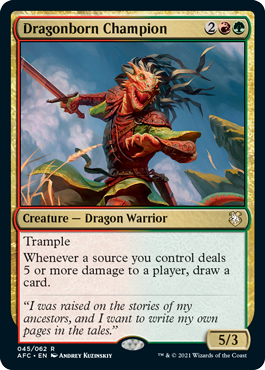
Dragonborn Champion
{2}{R}{G}
Creature — Dragon Warrior
5/3
Trample
Whenever a source you control deals 5 or more damage to a player, draw a card.
- Dragonborn Champion's last ability only triggers if 5 or more damage is dealt by the same source at the same time. If a source deals 3 damage to a player and then later deals 2 more damage to the same player, this will not cause the ability to trigger.
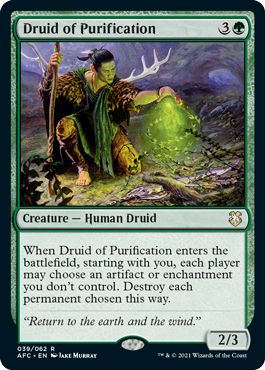
Druid of Purification
{3}{G}
Creature — Human Druid
2/3
When Druid of Purification enters the battlefield, starting with you, each player may choose an artifact or enchantment you don't control. Destroy each permanent chosen this way.
- Players make their choices in turn order and get to know what choices were made before theirs. They may choose an artifact or an enchantment that was already chosen by another player. Once all players have made their choices, the permanents are destroyed simultaneously.
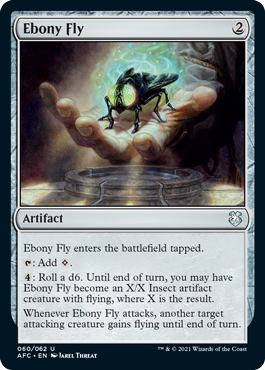
Ebony Fly
{2}
Artifact
Ebony Fly enters the battlefield tapped.
{T}: Add {C}.
{4}: Roll a d6. Until end of turn, you may have Ebony Fly become an X/X Insect artifact creature with flying, where X is the result.
Whenever Ebony Fly attacks, another target attacking creature gains flying until end of turn.
- You choose whether Ebony Fly becomes a creature as the second ability resolves, after you see the result of the die roll. If you don't choose to make it a creature at that time, you can't choose to make it a creature later in the turn unless you activate the ability again.
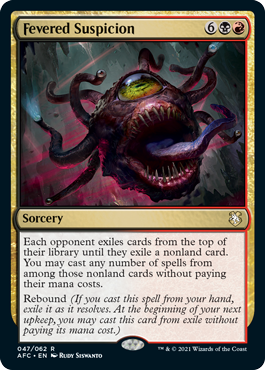
Fevered Suspicion
{6}{B}{R}
Sorcery
Each opponent exiles cards from the top of their library until they exile a nonland card. You may cast any number of spells from among those nonland cards without paying their mana costs.
Rebound (If you cast this spell from your hand, exile it as it resolves. At the beginning of your next upkeep, you may cast this card from exile without paying its mana cost.)
- You cast the cards exiled with Fevered Suspicion as it is resolving. If you choose not to cast them, you cannot cast them later.
- You may cast the exiled cards in any order, not just the order they were exiled.
- If you cast a spell "without paying its mana cost," you can't choose to cast it for any alternative costs. You can, however, pay additional costs. If the card has any mandatory additional costs, you must pay those to cast the spell.
- If the card has{X}in its mana cost, you must choose 0 as the value of X when casting it without paying its mana cost.
- Cards you don't cast this way, including any exiled land cards, will remain in exile indefinitely.
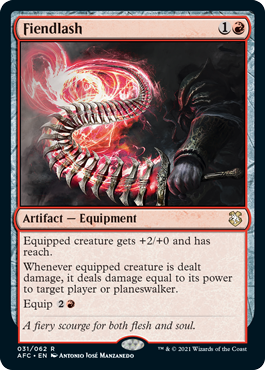
Fiendlash
{1}{R}
Artifact — Equipment
Equipped creature gets +2/+0 and has reach.
Whenever equipped creature is dealt damage, it deals damage equal to its power to target player or planeswalker.
Equip {2}{R}
- Use the equipped creature's power as the triggered ability resolves to determine how much damage is dealt. If the equipped creature is no longer on the battlefield at that time, use its power as it last existed on the battlefield.
- If the equipped creature isn't on the battlefield as the triggered ability resolves but it had lifelink when it left the battlefield, you will gain life.
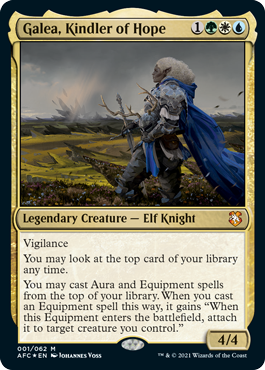
Galea, Kindler of Hope
{1}{G}{W}{U}
Legendary Creature — Elf Knight
4/4
Vigilance
You may look at the top card of your library any time.
You may cast Aura and Equipment spells from the top of your library. When you cast an Equipment spell this way, it gains "When this Equipment enters the battlefield, attach it to target creature you control."
- You can look at the top card of your library whenever you want (with one restriction; see below), even if you don't have priority. This action doesn't use the stack. Knowing what that card is becomes part of the information you have access to, just like you can look at the cards in your hand.
- If the top card of your library changes while you're casting a spell, playing a land, or activating an ability, you can't look at the new top card until you finish doing so. This means that if you cast a spell from the top of your library, you can't look at the next card until you're done paying for that spell.
- Galea, Kindler of Hope doesn't change when you can cast Aura and Equipment spells. Normally, this means during your main phase when the stack is empty, although flash may change this.
- You'll still pay all costs for the spell, including additional costs. You may also pay alternative costs if any are available.
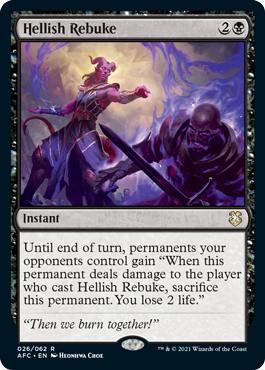
Hellish Rebuke
{2}{B}
Instant
Until end of turn, permanents your opponents control gain "When this permanent deals damage to the player who cast Hellish Rebuke, sacrifice this permanent. You lose 2 life."
- When the triggered ability that Hellish Rebuke grants permanents resolves, if that permanent's controller can't sacrifice it, they will still lose 2 life. Similarly, if they can't lose life, they will still sacrifice the permanent.
- If a player casts more than one Hellish Rebuke in a turn, permanents will gain multiple instances of the triggered ability. Each will trigger and resolve separately. For instance, if you cast Hellish Rebuke twice, each permanent which damaged you will cause its controller to lose 4 life.
- If more than one player casts Hellish Rebuke in a turn, some permanents will gain multiple instances of the triggered ability that refer to different players. Each will trigger only for the player who cast the Hellish Rebuke that granted it the ability.
- Copies of Hellish Rebuke that weren't cast will give opponents permanents the ability, but that ability won't do anything because no player cast that copy of Hellish Rebuke.
- If a spell or ability causes another player to gain control of Hellish Rebuke while it is on the stack, permanents controlled by the opponents of that player will gain the ability (probably including permanents you control). However, you're still the player that cast Hellish Rebuke, so the ability will trigger whenever one of those permanents deals damage to you, not the player who controlled Hellish Rebuke as it resolved.
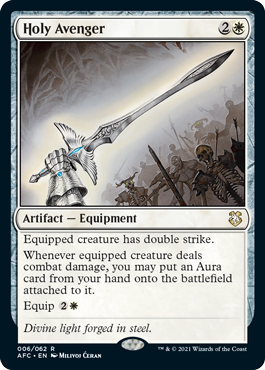
Holy Avenger
{2}{W}
Artifact — Equipment
Equipped creature has double strike.
Whenever equipped creature deals combat damage, you may put an Aura card from your hand onto the battlefield attached to it.
Equip {2}{W}
- You may put an Aura card onto the battlefield attached to the equipped creature if it could legally be attached to that creature.
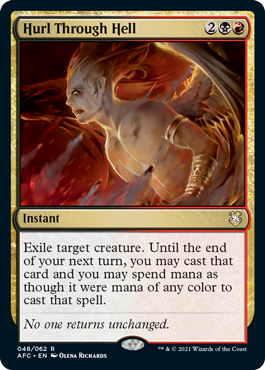
Hurl Through Hell
{2}{B}{R}
Instant
Exile target creature. Until the end of your next turn, you may cast that card and you may spend mana as though it were mana of any color to cast that spell.
- You must still follow all normal timing rules for casting the spell.
- If the creature you exile is actually a land card that was animated, you won't be able to play the land card from exile.
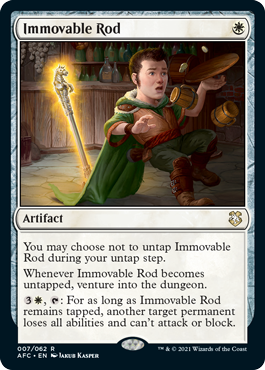
Immovable Rod
{W}
Artifact
You may choose not to untap Immovable Rod during your untap step.
Whenever Immovable Rod becomes untapped, venture into the dungeon.
{3}{W}, {T}: For as long as Immovable Rod remains tapped, another target permanent loses all abilities and can't attack or block.
- Some abilities still work even if they have been removed. Specifically, static abilities that change an object's types or change an object's colors will still apply even if those abilities are lost.
- If a creature has a characteristic-defining ability that sets its power and/or toughness loses that ability, the power and/or toughness (as appropriate) become 0.
- If you target an Aura with Immovable Rod's last ability, it will lose its enchant ability and be put into its owner's graveyard because it can't legally enchant anything. An Equipment that loses its abilities loses its equip ability, so you won't be able to move it that way, but it will stay attached to the creature it's equipping, if any.
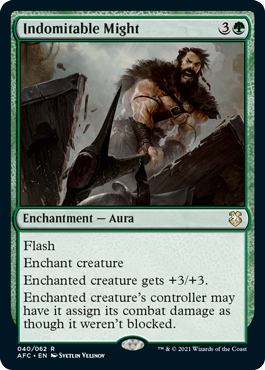
Indomitable Might
{3}{G}
Enchantment — Aura
Flash
Enchant creature
Enchanted creature gets +3/+3.
Enchanted creature's controller may have it assign its combat damage as though it weren't blocked.
- Assigning the creature's damage as though it weren't blocked is all or nothing. You can't use this effect to assign some of the creature's damage to a blocking creature and the rest to the defending player or planeswalker.
- Even if it assigns damage as though it were not blocked, it will still receive damage from creatures that are blocking it.
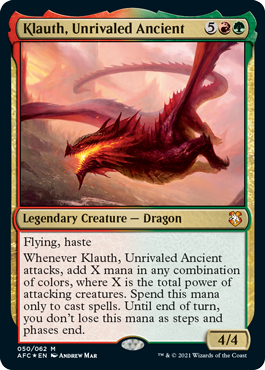
Klauth, Unrivaled Ancient
{5}{R}{G}
Legendary Creature — Dragon
4/4
Flying, haste
Whenever Klauth, Unrivaled Ancient attacks, add X mana in any combination of colors, where X is the total power of attacking creatures. Spend this mana only to cast spells. Until end of turn, you don't lose this mana as steps and phases end.
- Despite that fact that it can produce mana as it resolves, Klauth's triggered ability is not a mana ability because its trigger condition wasn't the activation or resolution of an activated mana ability. This means that it uses the stack and can be responded to. Notably, players can respond by destroying attacking creatures to reduce the amount of mana produced.
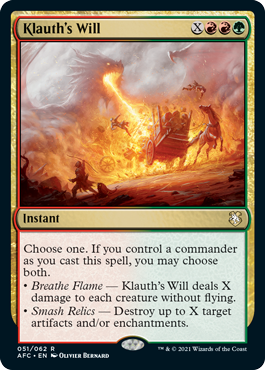
Klauth's Will
{X}{R}{R}{G}
Instant
Choose one. If you control a commander as you cast this spell, you may choose both.
• Breathe Flame — Klauth's Will deals X damage to each creature without flying.
• Smash Relics — Destroy up to X target artifacts and/or enchantments.
- The commander you control doesn't have to be your commander.
- Once you've announced that you're casting Klauth's Will, players can't take any actions until you've finished doing so. Notably, opponents can't try to remove your commander to change how many modes you may choose.
- Whether or not you control a commander is determined only once, as you choose the modes for this spell. If you somehow lose control of that commander before you finish casting the spell (perhaps because you sacrifice it to activate a mana ability), it won't change the number of modes chosen.
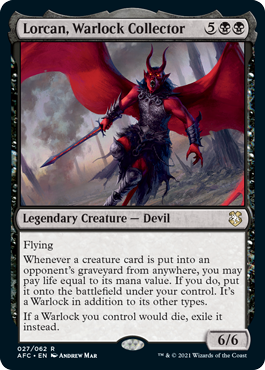
Lorcan, Warlock Collector
{5}{B}{B}
Legendary Creature — Devil
6/6
Flying
Whenever a creature card is put into an opponent's graveyard from anywhere, you may pay life equal to its mana value. If you do, put it onto the battlefield under your control. It's a Warlock in addition to its other types.
If a Warlock you control would die, exile it instead.
- Lorcan, Warlock Collector's second ability looks only at the type the card has in the graveyard, not the type it had in any other zone. For example, animated lands dying won't cause the ability to trigger. The opposite is also true. For example, if a creature that was cast as an Adventure is countered, it's a creature card in the graveyard and the triggered ability will trigger.
- Lorcan's last ability affects all Warlocks you control, not only ones he collected from an opponent's graveyard.
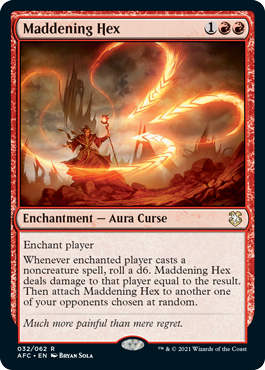
Maddening Hex
{1}{R}{R}
Enchantment — Aura Curse
Enchant player
Whenever enchanted player casts a noncreature spell, roll a d6. Maddening Hex deals damage to that player equal to the result. Then attach Maddening Hex to another one of your opponents chosen at random.
- If Maddening Hex is attached to your only opponent, it stays attached to that player as the ability resolves.
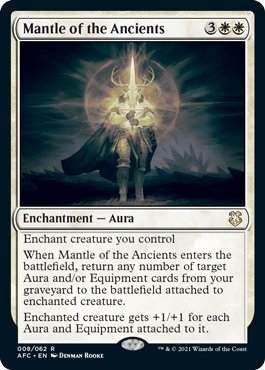
Mantle of the Ancients
{3}{W}{W}
Enchantment — Aura
Enchant creature you control
When Mantle of the Ancients enters the battlefield, return any number of target Aura and/or Equipment cards that could be attached to enchanted creature from your graveyard to the battlefield attached to enchanted creature.
Enchanted creature gets +1/+1 for each Aura and Equipment attached to it.
- Mantle of the Ancients has received an update to its Oracle text. The official text is listed above. Specifically, you may only choose Aura and Equipment cards in your graveyard that could be legally attached to the creature enchanted by Mantle of the Ancients.
- As the enters-the-battlefield ability is resolving, any targets that couldn't be legally attached to the creature enchanted by Mantle of the Ancients stay in your graveyard.
- If Mantle of the Ancients becomes attached to a different creature in response to its enters-the-battlefield ability, the creature it's attached to as that ability is resolving is the "enchanted creature," even though you used the original enchanted creature to choose targets. This means some of those targets may become illegal.
- If Mantle of the Ancients leaves the battlefield before its enters-the-battlefield ability resolves, the last permanent it was attached to before leaving the battlefield is the "enchanted creature" (even if that permanent is no longer a creature).
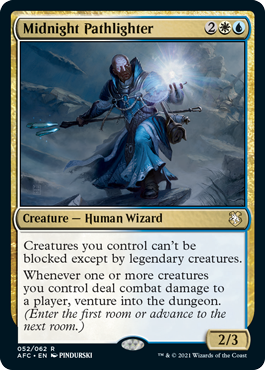
Midnight Pathlighter
{2}{W}{U}
Creature — Human Wizard
2/3
Creatures you control can't be blocked except by legendary creatures.
Whenever one or more creatures you control deal combat damage to a player, venture into the dungeon. (Enter the first room or advance to the next room.)
- Unblocked creatures with double strike deal damage twice, which will cause Midnight Pathlighter's last ability to trigger twice.
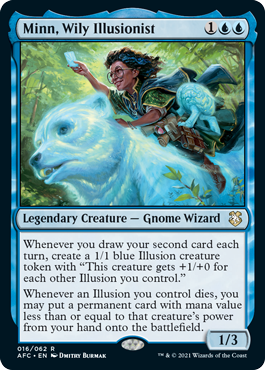
Minn, Wily Illusionist
{1}{U}{U}
Legendary Creature — Gnome Wizard
1/3
Whenever you draw your second card each turn, create a 1/1 blue Illusion creature token with "This creature gets +1/+0 for each other Illusion you control."
Whenever an Illusion you control dies, you may put a permanent card with mana value less than or equal to that creature's power from your hand onto the battlefield.
- Minn's last ability uses the Illusion's power the last time it existed on the battlefield to determine what cards you may put onto the battlefield.
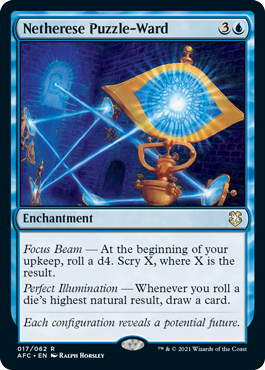
Netherese Puzzle-Ward
{3}{U}
Enchantment
Focus Beam — At the beginning of your upkeep, roll a d4. Scry X, where X is the result.
Perfect Illumination — Whenever you roll a die's highest natural result, draw a card.
- If you roll a natural 4 while resolving the Focus Beam ability, you will scry before you draw a card for the Perfect Illumination ability.
- If you're instructed to roll multiple dice (with one exception, see below) and more than one shows the highest natural result, the Perfect Illumination ability will trigger that many times.
- Any die roll that is ignored, such as from Pixie Guide's effect, will not cause the Perfect Illumination ability to trigger.
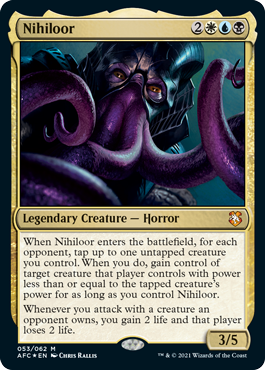
Nihiloor
{2}{W}{U}{B}
Legendary Creature — Horror
3/5
When Nihiloor enters the battlefield, for each opponent, tap up to one untapped creature you control. When you do, gain control of target creature that player controls with power less than or equal to the tapped creature's power for as long as you control Nihiloor.
Whenever you attack with a creature an opponent owns, you gain 2 life and that player loses 2 life.
- As Nihiloor's first triggered ability resolves, you choose up to one creature for each opponent, and tap them all at the same time. Then, a separate triggered ability is put on the stack for each creature you tapped this way. Those abilities are placed on the stack in the order you choose. If tapping those creature caused any other abilities you control to trigger, those are also placed on the stack at this time.
- Both the tapped creature's power and the target creature's power are checked both as you put the ability on the stack and as the ability resolves in order to make sure the target is legal.
- If the tapped creature is no longer on the battlefield as the trigger resolves, use its last existence on the battlefield to determine whether the target is still legal as the ability resolves.
- If a creature you tapped for Nihiloor's ability is somehow no longer tapped as the reflexive triggered ability resolves, that ability will still resolve and you will still gain control of the target as long as it has less power than the creature you tapped.
- If Nihiloor leaves the battlefield before its enters-the-battlefield ability resolves or before its reflexive triggered abilities resolve, then you won't gain control of any creatures.
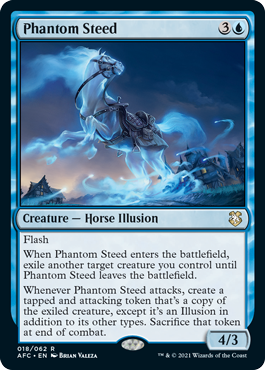
Phantom Steed
{3}{U}
Creature — Horse Illusion
4/3
Flash
When Phantom Steed enters the battlefield, exile another target creature you control until Phantom Steed leaves the battlefield.
Whenever Phantom Steed attacks, create a tapped and attacking token that's a copy of the exiled card, except it's an Illusion in addition to its other types. Sacrifice that token at end of combat.
- Phantom Steed has received a nonfunctional update to its wording. The printed card refers to the "exiled creature." The corrected text ("exiled card") is included above.
- If Phantom Steed leaves the battlefield before its ability resolves, the target creature won't be exiled.
- Auras attached to the exiled creature will be put into their owners' graveyards. Any Equipment will become unattached and remain on the battlefield. Any counters on the exiled creature will cease to exist. When the card returns to the battlefield, it will be a new object with no connection to the card that was exiled.
- If a token is exiled this way, it will cease to exist and won't return to the battlefield. Phantom Steed's last ability won't create any tokens.
- Although the token created by the triggered ability is attacking, it was never declared as an attacking creature (for the purposes of abilities that trigger whenever a creature attacks, for example).
- You declare which player or planeswalker the token is attacking as you put it onto the battlefield. It doesn't have to be the same player or planeswalker Phantom Steed is attacking.
- If the exiled card has {X} in its mana cost, X is 0.
- Any enters-the-battlefield abilities of the copied creature will trigger when the token enters the battlefield. Any "As [this creature] enters the battlefield" or "[This creature] enters the battlefield with" abilities of the copied creature will also work.
- If Phantom Steed somehow exiles a noncreature card, such as an animated land, it will still create a copy of that card when it attacks. It enters the battlefield tapped and will be sacrificed at the end of combat. However, it is not attacking and it is not an Illusion.
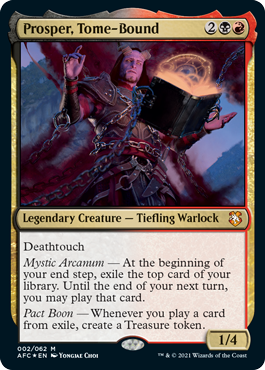
Prosper, Tome-Bound
{2}{B}{R}
Legendary Creature — Tiefling Warlock
1/4
Deathtouch
Mystic Arcanum — At the beginning of your end step, exile the top card of your library. Until the end of your next turn, you may play that card.
Pact Boon — Whenever you play a card from exile, create a Treasure token.
- You must still pay all costs and follow all timing rules for cards played with the Mystic Arcanum ability.
- The Pact Boon ability triggers whenever you play any cards from exile, not just those exiled with the Mystic Arcanum ability.
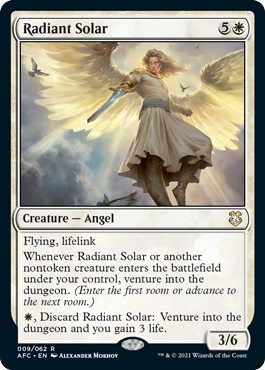
Radiant Solar
{5}{W}
Creature — Angel
3/6
Flying, lifelink
Whenever Radiant Solar or another nontoken creature enters the battlefield under your control, venture into the dungeon. (Enter the first room or advance to the next room.)
{W}, Discard Radiant Solar: Venture into the dungeon and you gain 3 life.
- A token copy of Radiant Solar entering the battlefield will cause its own ability to trigger, but not that of any other Radiant Solars.
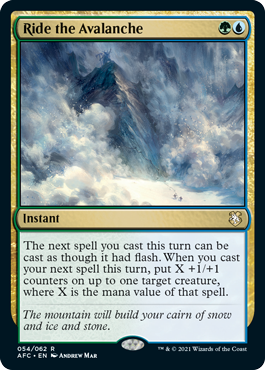
Ride the Avalanche
{G}{U}
Instant
The next spell you cast this turn can be cast as though it had flash. When you cast your next spell this turn, put X +1/+1 counters on up to one target creature, where X is the mana value of that spell.
- Casting Ride the Avalanche doesn't require a target. As you put the delayed triggered ability on the stack after casting your next spell, you choose the target creature, if any.
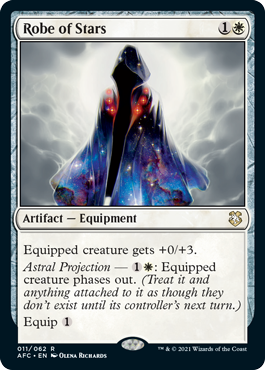
Robe of Stars
{1}{W}
Artifact — Equipment
Equipped creature gets +0/+3.
Astral Projection — {1}{W}: Equipped creature phases out. (Treat it and anything attached to it as though they don't exist until its controller's next turn.)
Equip {1}
- Phased out permanents are treated as though they don't exist. They can't be the target of spells or abilities, their static abilities have no effect on the game, their triggered abilities can't trigger, they can't attack or block, and so on.
- Notably, this means you cannot equip Robe of Stars to another creature while it is phased out. If you activate the Astral Projection ability of an attached Robe of Stars in response to the equip ability, Robe of Stars will be phased out before the equip ability resolves and will not be moved.
- As a creature is phased out, Auras and Equipment attached to it (including Robe of Stars) also phase out at the same time. Those Auras and Equipment will phase in attached to the creature they were attached to when they phased out.
- Permanents phase back in during their controller's untap step, immediately before that player untaps their permanents. Creatures that phase in this way are able to attack and pay a cost of {T} during that turn. If a permanent had counters on it when it phased out, it will have those counters when it phases back in.
- An attacking or blocking creature that phases out is removed from combat.
- Phasing out doesn't cause any "leaves the battlefield" abilities to trigger. Similarly, phasing in won't cause any "enters the battlefield" abilities to trigger.
- Any continuous effects with a "for as long as" duration, such as that of Mind Flayer, ignore phased-out objects. If ignoring those objects causes the effect's conditions to no longer be met, the duration will expire.
- Choices made for permanents as they entered the battlefield are remembered when they phase in.
- If an opponent gains control of one of your creatures, that creature phases out, and the duration of the control-change effect expires before it phases back in, that creature phases in under your control as that opponent's next untap step begins. If they leave the game before their next untap step, it phases in as the next untap step begins after their turn would have begun.
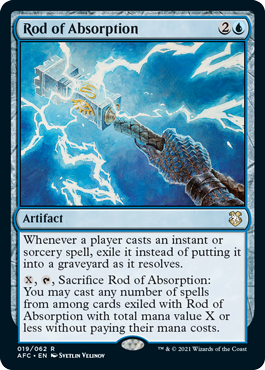
Rod of Absorption
{2}{U}
Artifact
Whenever a player casts an instant or sorcery spell, exile it instead of putting it into a graveyard as it resolves.
{X}, {T}, Sacrifice Rod of Absorption: You may cast any number of spells from among cards exiled with Rod of Absorption with total mana value X or less without paying their mana costs.
- If multiple Rods of Absorption are on the battlefield at the same time, any player casting an instant or sorcery spell will cause all of them to trigger. As the spell resolves, its controller will choose which of the Rods gets to exile it.
- Each Rod of Absorption tracks the cards it has exiled separately. If Rod of Absorption is destroyed and then later brought back to the battlefield, it will not be able to access any of the cards that it had exiled before.
- If a spell is countered or it never resolves, Rod of Absorption will not exile it.
- When Rod of Absorption's last ability resolves, you cast as many spells with total mana value X or less from among the exiled cards as you would like in any order you choose. Cards not cast this way will remain in exile indefinitely.
- If you cast a spell "without paying its mana cost," you can't choose to cast it for any alternative costs. You can, however, pay additional costs. If the card has any mandatory additional costs, you must pay those to cast the spell.
- If the card has{X}in its mana cost, you must choose 0 as the value of X when casting it without paying its mana cost.
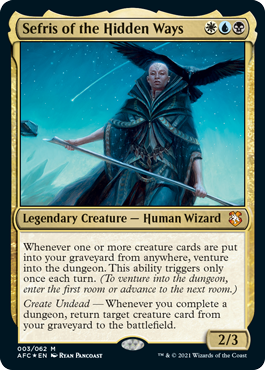
Sefris of the Hidden Ways
{W}{U}{B}
Legendary Creature — Human Wizard
2/3
Whenever one or more creature cards are put into your graveyard from anywhere, venture into the dungeon. This ability triggers only once each turn. (To venture into the dungeon, enter the first room or advance to the next room.)
Create Undead — Whenever you complete a dungeon, return target creature card from your graveyard to the battlefield.
- Sefris of the Hidden Ways' first ability looks only at the type the card has in the graveyard, not the type it had in any other zone. For example, animated lands dying won't cause the ability to trigger. The opposite is also true. For example, if a creature that was cast as an Adventure is countered, it's a creature card in the graveyard and the first ability will trigger.
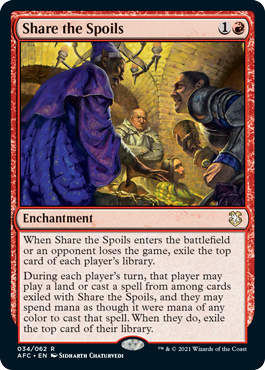
Share the Spoils
{1}{R}
Enchantment
When Share the Spoils enters the battlefield or an opponent loses the game, exile the top card of each player's library.
During each player's turn, that player may play a land or cast a spell from among cards exiled with Share the Spoils, and they may spend mana as though it were mana of any color to cast that spell. When they do, exile the top card of their library.
- Once a player plays a land or casts a spell from among the exiled cards, they can't play any more of those cards that turn. That is, it's one land or one spell, not one of each.
- Playing a card this way follows all the normal timing rules for that card. For example, if you play a land this way, you may do so only during your main phase while the stack is empty and only if you havem't yet played a land (unless another effect allows you to play additional lands).
- If you control an opponent's Share the Spoils and that player loses the game, Share the Spoils leaves the game with them and the first ability won't trigger.
- Once Share the Spoils leaves the battlefield, players may no longer play the exiled cards. If Share the Spoils is destroyed and somehow returns to the battlefield, it's a new object with no memory of the previously exiled cards.
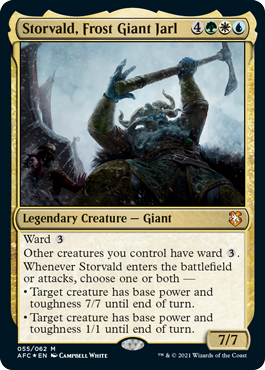
Storvald, Frost Giant Jarl
{4}{G}{W}{U}
Legendary Creature — Giant
7/7
Ward {3}
Other creatures you control have ward {3}.
Whenever Storvald enters the battlefield or attacks, choose one or both —
• Target creature has base power and toughness 7/7 until end of turn.
• Target creature has base power and toughness 1/1 until end of turn.
- Storvald's triggered ability will overwrite any previous effects that set the creature's power and toughness to specific numbers. Effects that otherwise modify that creature's power and toughness will still apply no matter when they took effect. The same is true for +1/+1 counters.
- If you choose both modes, the effects will happen in the listed order.
- You can choose the same creature as the target for both modes if you wanted to—I don't know . . . give it a small taste of phenomenal cosmic power before shrinking it so it could live in an itty-bitty living space?
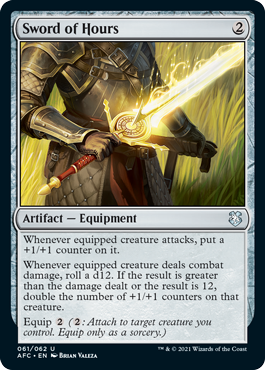
Sword of Hours
{2}
Artifact — Equipment
Whenever equipped creature attacks, put a +1/+1 counter on it.
Whenever equipped creature deals combat damage, roll a d12. If the result is greater than the damage dealt or the result is 12, double the number of +1/+1 counters on that creature.
Equip {2} ({2}: Attach to target creature you control. Equip only as a sorcery.)
- To double the number of +1/+1 counters on a permanent, count the number of +1/+1 counters that are currently on that permanent and put that many more on it. Any replacement effects that change this number will apply accordingly.
- If the equipped creature takes lethal damage at the same time that it deals combat damage, it will die before the counters on it can be doubled. However, you will still roll a d12, which may cause abilities of other permanents to trigger.
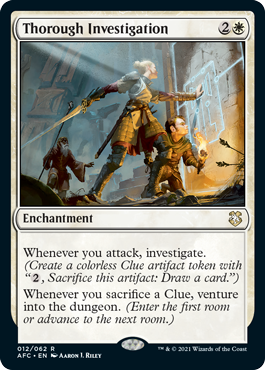
Thorough Investigation
{2}{W}
Enchantment
Whenever you attack, investigate. (Create a colorless Clue artifact token with "{2}, Sacrifice this artifact: Draw a card.")
Whenever you sacrifice a Clue, venture into the dungeon. (Enter the first room or advance to the next room.)
- Thorough Investigation's first ability can trigger only once per combat, no matter how many creatures you attack with.
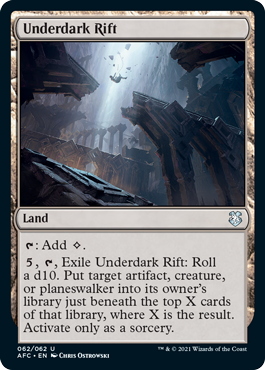
Underdark Rift
Land
{T}: Add {C}.
{5}, {T}, Exile Underdark Rift: Roll a d10. Put target artifact, creature, or planeswalker into its owner's library just beneath the top X cards of that library, where X is the result. Activate only as a sorcery.
- If that permanent's owner has fewer than X cards in their library, put the permanent on the bottom of its owner's library.
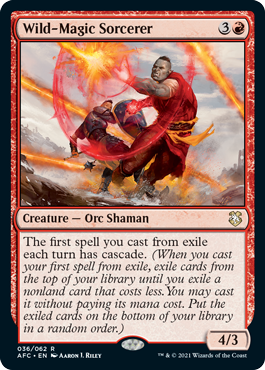
Wild-Magic Sorcerer
{3}{R}
Creature — Orc Shaman
4/3
The first spell you cast from exile each turn has cascade. (When you cast your first spell from exile, exile cards from the top of your library until you exile a nonland card that costs less. You may cast it without paying its mana cost. Put the exiled cards on the bottom of your library in a random order.)
- The first spell you cast from exile each turn will have cascade, even if it's not the first spell you've cast that turn.
- However, if you cast a spell from exile and then later that turn Wild-Magic Sorcerer comes under your control, Wild-Mage Sorcerer won't give cascade to any other spell you cast from exile that turn.
- If you control more than one Wild-Magic Sorcerer, the first spell you cast from exile will have that many instances of cascade, each of which will trigger separately.
- If, while resolving the cascade ability from the first spell you cast from exile in a turn, you cascade into a second Wild-Magic Sorcerer, the spell will not cascade again.
- A spell's mana value is determined only by its mana cost. Ignore any alternative costs, additional costs, cost increases, or cost reductions. For example, Wild-Magic Sorcerer's mana value is always 4.
- Cascade triggers when you cast the spell, meaning that it resolves before that spell. If you end up casting the exiled card, it will go on the stack above the spell with cascade.
- When the cascade ability resolves, you must exile cards. The only optional part of the ability is whether or not you cast the last card exiled.
- If a spell with cascade is countered, the cascade ability will still resolve normally.
- You exile the cards face up. All players will be able to see them.
- If you cast a card "without paying its mana cost," you can't choose to cast it for any alternative costs. You can, however, pay additional costs. If the card has any mandatory additional costs, you must pay those to cast the card.
- If the card has {X} in its mana cost, you must choose 0 as the value of X when casting it without paying its mana cost.
- Due to a recent rules change to cascade, not only do you stop exiling cards if you exile a nonland card with lesser mana value than the spell with cascade, but the resulting spell you cast must also have lesser mana value. Previously, in cases where a card's mana value differed from the resulting spell, such as with some modal double-faced cards or cards with an Adventure, you could cast a spell with a higher mana value than the exiled card.
- The mana value of a split card is determined by the combined mana cost of its two halves. If cascade allows you to cast a split card, you may cast either half but not both halves.
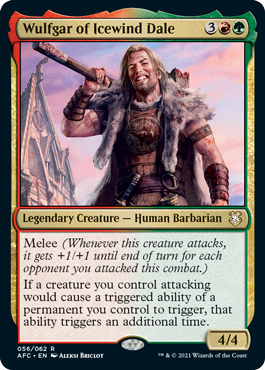
Wulfgar of Icewind Dale
{3}{R}{G}
Legendary Creature — Human Barbarian
4/4
Melee (Whenever this creature attacks, it gets +1/+1 until end of turn for each opponent you attacked this combat.)
If a creature you control attacking would cause a triggered ability of a permanent you control to trigger, that ability triggers an additional time.
- Wulfgar of Icewind Dale's last ability affects only triggered abilities with conditions that are directly related to attacking, such as "whenever this creature attacks" or "whenever you attack with one or more creatures." It does not affect triggered abilities with other trigger conditions, such as "whenever this creature becomes tapped."
- Wulfgar's last ability will cause its melee ability to trigger an additional time.
Magic: The Gathering, Magic, Adventures in the Forgotten Realms, Dungeons & Dragons, Strixhaven: School of Mages, Kaldheim, Zendikar, Eldraine, Theros, and Ikoria are trademarks of Wizards of the Coast LLC in the USA and other countries. ©2021 Wizards.
